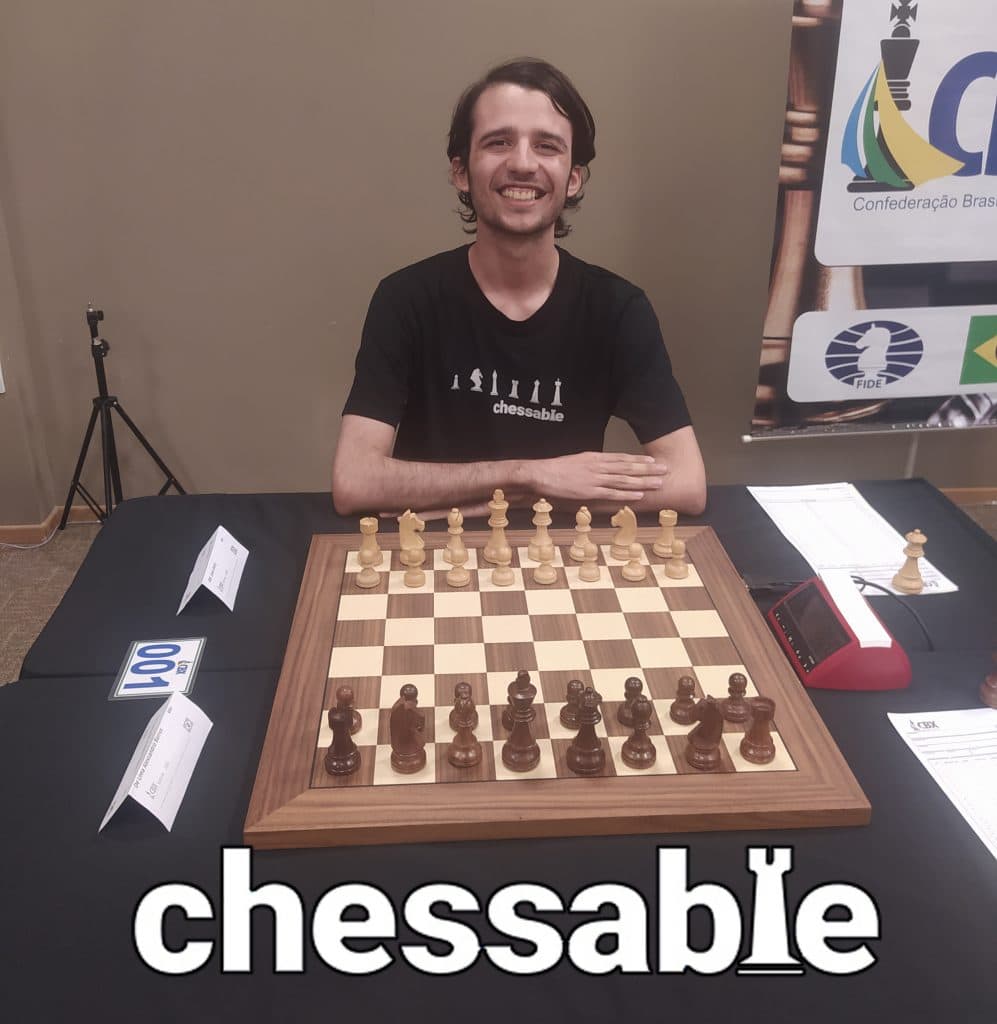This is a guest post by Adriano, a Chessable user, who shares his interesting chess journey so far… We love his enthusiasm, his passion for the game, and that he packs a deadly Muay Thai kick behind that innocent smile. Hope you like his story as we did. If you missed his earlier post, read it here.
Introduction
Long time no see, eh? I’m delighted in having a second opportunity to be a guest poster! If you don’t know me yet, I’m Adriano, a 22 years old chess fan from Brazil. Outside of the 64 squares, I’m a university student who is currently pursuing a teaching degree, maybe one day I can become a full-fledged professor! Somehow, I found some time for chess, and here I am, writing an even bigger blog post! I already wrote about my history with chess and Chessable, how I learned the game and how my early days were, plus a couple of other things, I urge the reader to read it before going through this one. In this new post, I’m bringing some cool updates!
As you know, the first blog post is a case-study where I took the liberty of making the whole thing personal. I emphasized the human aspect there, often overlooking the competitive side. A lot of things happened since then, such as gaining my first FIDE rating AND, no less important, the National Master title. I also became eligible to the FIDE Candidate Master title, which I’ll be awarded conditionally (I’ll give more details later). Yes, I managed to accomplish a major goal in my short chess career, but it’s far from over, I felt more motivated to keep playing!
I wrote this in a way that allows non chess players to read without being lost in the technical part, just like my previous post. This one is a bit heavier in the pure chess parts, though, as I describe briefly how the games went, but I ask the reader to simply ignore those details to keep a smooth reading. Knowing that people outside of the chess world are reading my texts makes me quite happy!
I would like to thank everyone who supported me so far, it doesn’t matter if you’re inside or outside of our 64 squares world, I would’ve abandoned this game if I was all by myself. What you’re about to see is a little demonstration of the power of the sport in my life, even though it’s just a hobby for me, and I want this as a proof of how many marvelous things can happen if you allow yourself to dive deeply in the tiniest of the opportunities that can appear in your life. I hope you enjoy reading this blog post as much as I enjoyed writing it! If this helps in you in 1%, I already did my job. I can’t wait to hear and discuss what I have said here!
Acquiring my FIDE rating!
In this first section, I’ll link this whole post to my previous one, which was published in January. If you didn’t read it yet, I kindly ask you to have a look on it, as there is some context (especially my relationship with the Chessable community) that will be mentioned here. Shortly after its publication, an important opportunity appeared: the Norte-Nordeste Amador, an amateur chess championship for the North and Northeast regions of Brazil. There were U1400, U1600, U1800, U2000 and U2200 categories. Can you guess which one I took? Yes, the highest one! Being an unrated player gave me the right of choosing any category I wanted, and even though I considered playing in a lower category so I could have better chances of getting prizes, in the end I concluded I would jeopardize my chances of becoming a titled player if I started out with a lower FIDE rating. I joined the U2200 category, expecting to make at least 3/6 to see if I could make a high initial FIDE rating. The field had a couple of NMs, one FM and one CM, the CM being the top seed, so I had to make good fights!
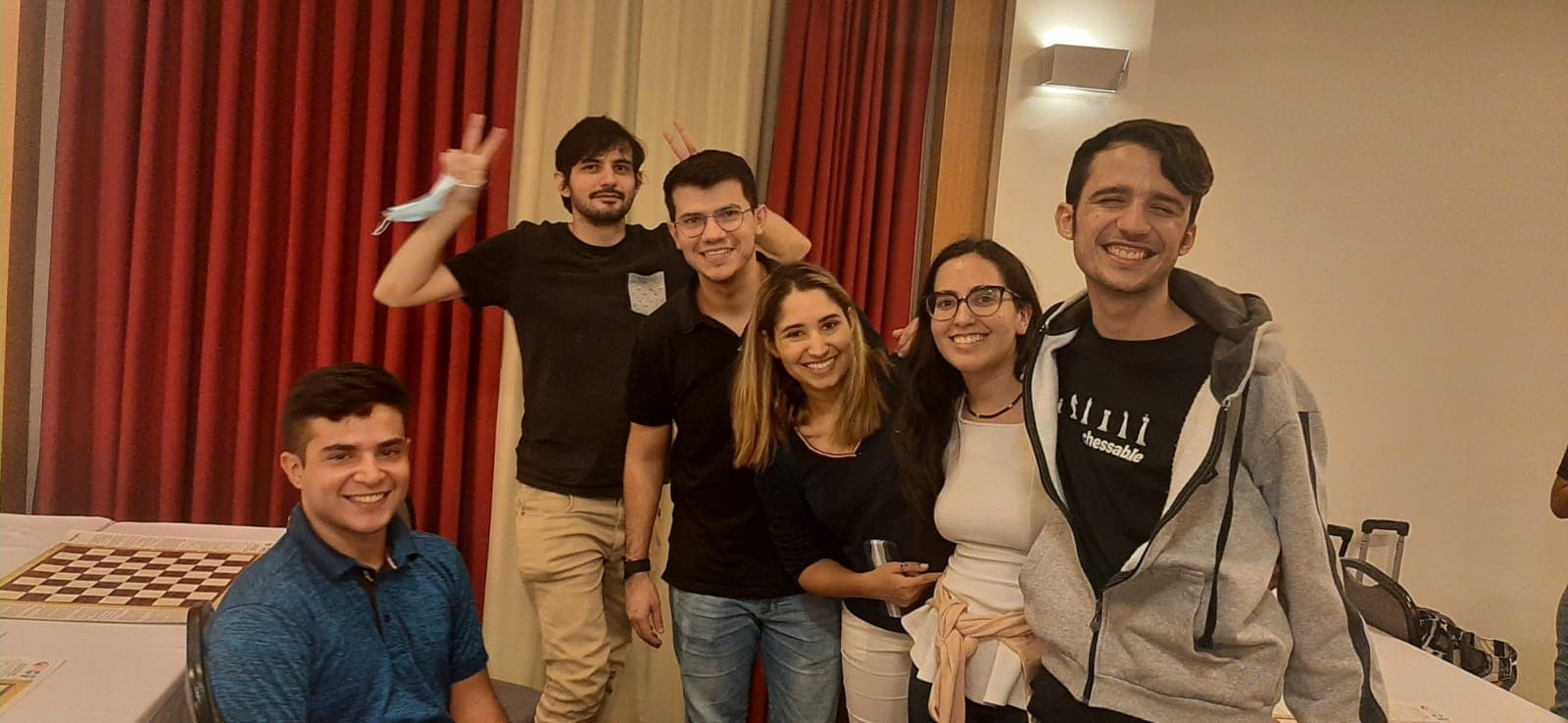 Seeing some old friends at the tournament! Nicolas, Roberto, Iran, Mariah and Marina!
Seeing some old friends at the tournament! Nicolas, Roberto, Iran, Mariah and Marina!
I have published and annotated all of games, and you can find them here: https://lichess.org/study/CXesDbNp. I’ll just give a quick “too long, didn’t read” version, of course. In the first game, I faced a FM, and because I was paranoid with opening prep in the remaining rounds, I played the Classical Sicilian looking for a fight. He played reasonably fine, and my lack of sicilian education made me crumble without a fight – perhaps if I believed more in myself, I would have played the Caro-Kann and give him a tougher challenge. In the second game, I took a bye. In the third game, I faced the top seed, a CM rated 2150 FIDE who once peaked at 2280, and he over-pressed in an equal position allowing me to get a winning pawn endgame, granting my second win over a titled player in a classical OTB game! The fourth game was a tough fight against a NM, where I missed my opportunities and had to struggle in the late middlegame, where I even missed a drawing trick and I went on to lose. In the fifth round, I faced a 1976 FIDE player (who later became a NM himself), and I unleashed the powerful Scandinavian defense, and I went on to grind the win in the endgame! The sixth final round was against a senior player rated 2026 FIDE who surprisingly still had the k40 factor, implying the lack of FIDE events in his curriculum. The man didn’t lose a single game in that tournament, and I definitely had my chances already in the late stages of the opening, the powerful Caro-Kann! However, I lost my thread a bit, and after completely missing a relatively simple passive move that would secure a draw in a rook endgame, the draw was a bit too difficult to attain afterwards and I went on to lose. I guess it was his tournament anyway, he became NM with his impressive run.
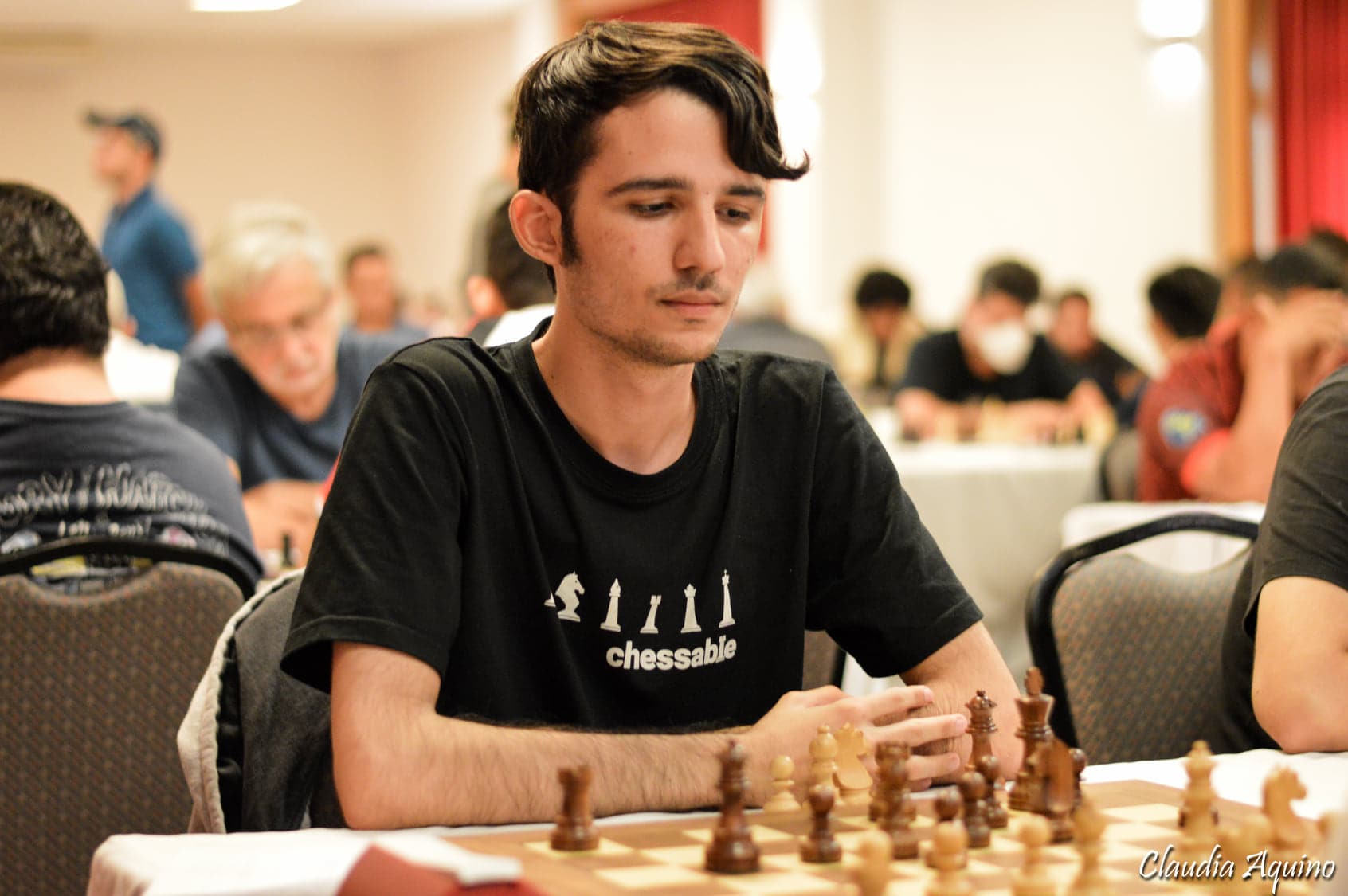 “Looking like a Disney villain!”, said ‘Vatbrain’, one of the best compliments ever! Photo by IA Claudia Aquino.
“Looking like a Disney villain!”, said ‘Vatbrain’, one of the best compliments ever! Photo by IA Claudia Aquino.
I was unaware at the time how exactly my FIDE rating would be built, I was thinking it would depend on how I would perform against higher rated players, and since I beat the top seed, I believed I would be easily above 2000. When I checked the FIDE regulations, I learned that my new rating would be the average rating of my opponents if I had scored half of the possible points, 2,5/5 (the bye doesn’t count for the rating creation), and the average rating was 2047; because I failed in holding the draw in the final round, I ended up with 2/5, and having a half of point less would mean -72 points according to the regulations, so my initial FIDE rating would be 1965, which I confirmed in the May list. Definitely a very good initial rating, but I would be lying if I say that I didn’t feel the impact of those 72 points less due to a single slip. In any case, I would keep the famous k40 for the next 24 games, so I would remain able to skyrocket my rating if I perform well enough in the next FIDE tournaments. But when would I get another FIDE event?
 There is always time for sightseeing! Somehow, I felt was the only one to enjoy the beautiful Rio Verde! Too much excitement from my part, I guess.
There is always time for sightseeing! Somehow, I felt was the only one to enjoy the beautiful Rio Verde! Too much excitement from my part, I guess.
There was no time to rest, though! A month later, I had an international qualifier event in a city called Rio Verde, in the state of Goiás, 2400+ km away from my hometown. My university covered the plane tickets, while the government covered the rest of the costs. I would play under no pressure at all, thankfully! I enjoyed the trip, it was five rounds and I scored 2,5/5, which made me wonder if I didn’t relax a bit too much. I would say that my adventures in that state were mostly outside of the 64 squares, especially to return to my city – I took a day and a half to reach the Guarulhos airport in São Paulo, arriving there at 11 PM, and my flight was scheduled to 5 AM the following day! I decided to stay awake so I wouldn’t risk missing the flight, and it was totally worth it! That trip was unexpected, but it was quite fun!
Then I returned to my normal life, but I had to prepare for the qualifiers to the Jogos Universitários Brasileiros 2022 (from now on, I’ll refer to it as “JUBS”), an intercollegiate national event. As you know, I played in the 2021 edition, and I was focused to keep my spot one more time. I would play against a couple of the best college students of my state, I needed to keep my head cool.
 We are always little kids! One of them in the picture. the one with the orange shirt, is a 19 y.o. FM rated 2356 FIDE at the time I write this! Witness the power! Mariah, Garcett, Dobuchak and Nathan!
We are always little kids! One of them in the picture. the one with the orange shirt, is a 19 y.o. FM rated 2356 FIDE at the time I write this! Witness the power! Mariah, Garcett, Dobuchak and Nathan!
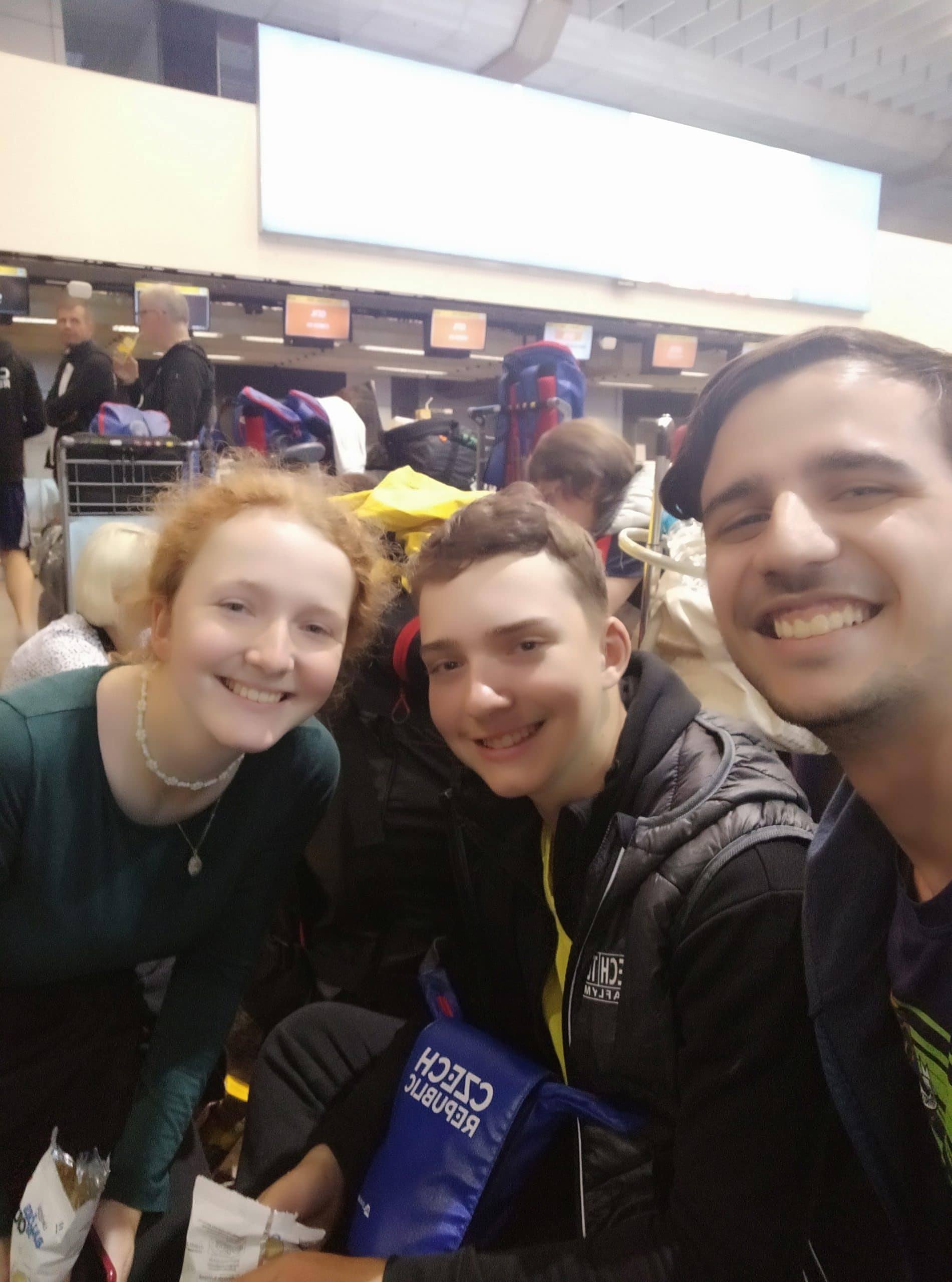 At the Guarulhos airport, in São Paulo, I met Zuzana and Richard, two lovely athletes of the Deaflympics from Czech Republic! Their team had problems with a flight, and given that I’m not really a shy person, I decided to try out my spoken English! Midnight adventures!
At the Guarulhos airport, in São Paulo, I met Zuzana and Richard, two lovely athletes of the Deaflympics from Czech Republic! Their team had problems with a flight, and given that I’m not really a shy person, I decided to try out my spoken English! Midnight adventures!
By the end of July, I was paired with the lowest seed of the event, whom I outrated by almost 1000 points on Lichess, everyone (myself included) thought it would be a trivial game, but no, I completely blundered a full piece in a winning position! The problem wasn’t even losing that game, but mainly the fact that losing any game from that point would mean that I would be out of the JUBS 2022. I won the second game, and with the White pieces I got paired with my fellow teammate in the third round, we both needed to win! After a long struggle in the Queen’s Gambit Accepted, we had to accept the draw, I was quite depressed thinking that I would be out because I know there is a tie-breaker that favors Black… until I realized that I only needed to beat the player who beat my teammate! So yeah, two rounds remaining and I needed to win both! I was able to pull a miniature win against the leader, and then I got the Black against a player who didn’t have chances to qualify anymore. However, since my teammate was a closer friend to him, my opponent decided to play for at least a draw.
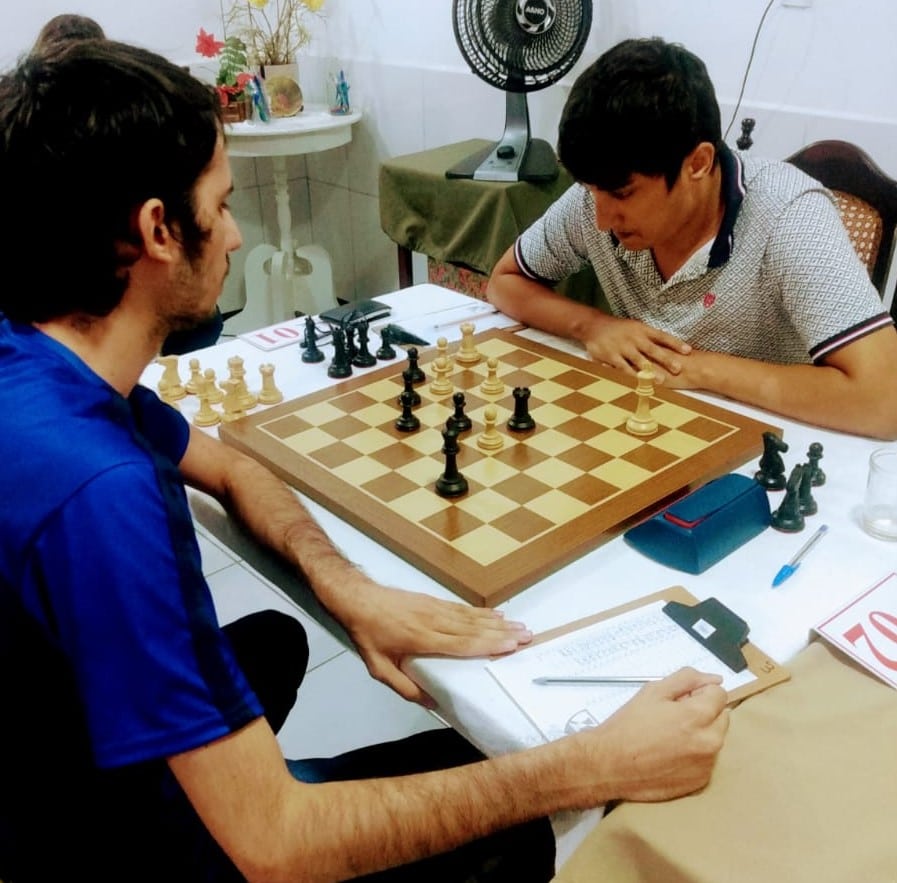 One of my toughest games ever! Facing my friend Adiel! In the picture, I’m about to play 77… Rxd5, reaping the fruits of a long grind, but the job wasn’t finished yet.
One of my toughest games ever! Facing my friend Adiel! In the picture, I’m about to play 77… Rxd5, reaping the fruits of a long grind, but the job wasn’t finished yet.
I analyzed the full game above and published it as a study on Lichess, you can see it here: https://lichess.org/study/z84Meden. Again, a “too long, didn’t read version”: I basically got paranoid with the possibility of having to play for a win against a sterile line of the Exchange Slav, a suspicion that I later confirmed to be correct, so I prepared the Benko gambit and the 1. d4 Nf6 2. c4 c5 3. Nf3 variation as Black. By move 10 we both were out of the book, but soon White got a strong piece pressure in the center of the kingside. White failed to capitalize on his advantage, possibly for being too comfortable with a draw, and I was able to equalize after a lot of suffering. Not that would be good news either, the pawn structure was symmetrical and a draw was seeming very likely. After a long fight, I succeeded in extracting water from the stone, winning the game in 98 moves and five hours of play! Tell me about persistence! The stress I had in the game reminded me why I will never pursue a more serious approach to competitive chess. I want to attain the FM title before retiring from competitive play, so we’ll see how far I can go.
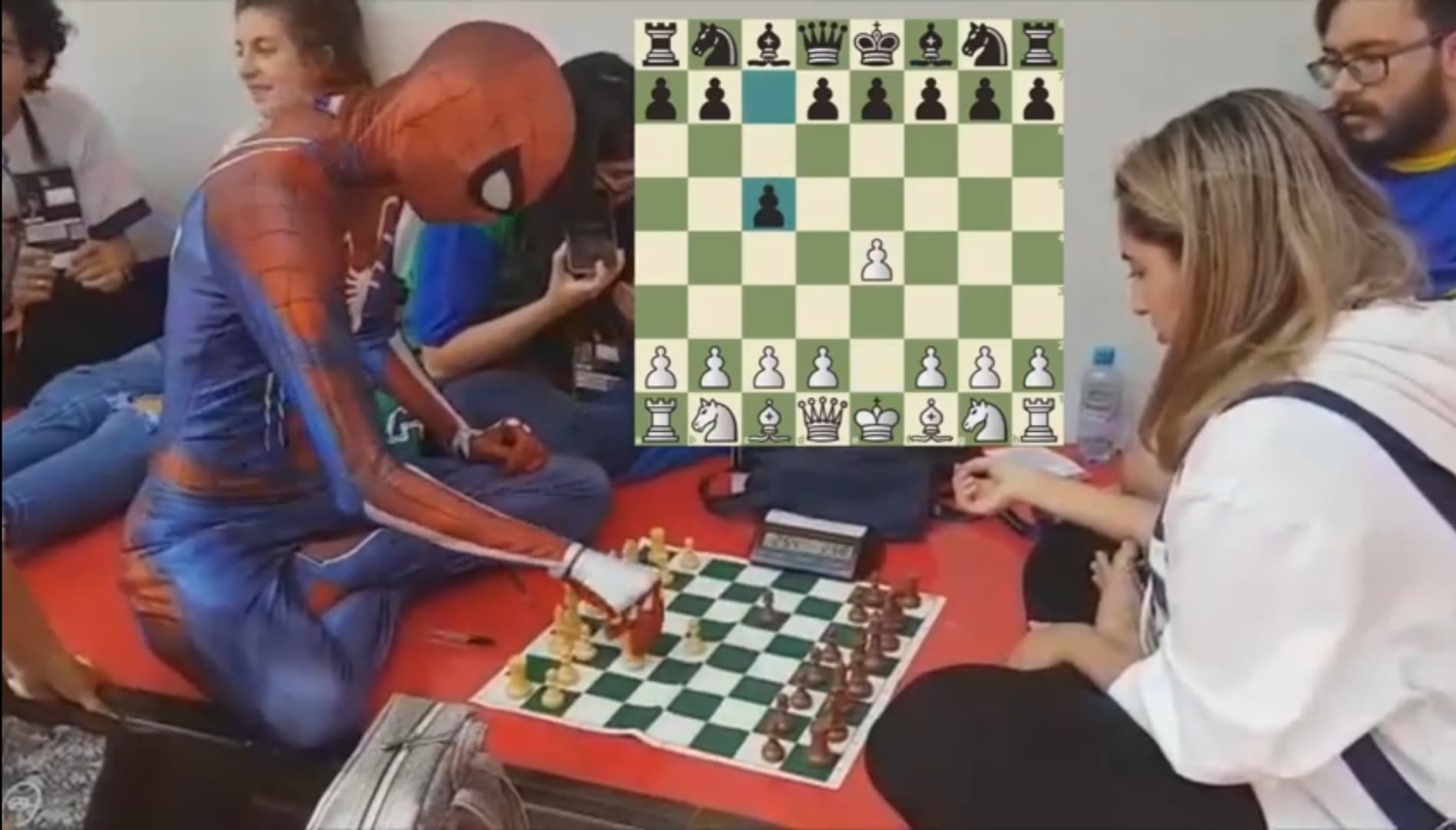 Do you believe that I own a Spider-Man costume? Yep, secret identity revealed. No one besides the chess players knew it was me behind the mask! In the picture, I was playing a hand & brain game and I was kinda forced to play 1. e4 so I could help my partner.
Do you believe that I own a Spider-Man costume? Yep, secret identity revealed. No one besides the chess players knew it was me behind the mask! In the picture, I was playing a hand & brain game and I was kinda forced to play 1. e4 so I could help my partner.
I secured my spot for JUBS 2022, and this time it would start at September 18 and it would last until September 24. My birthday is in September 22 (I hope staff will forgive me for mentioning this thread: https://www.chessable.com/discussion/thread/263201/my-birthday-is-today/), meaning that I would have my first birthday away from my family. I was wondering how that experience would be. My university once again covered the plane tickets, the event itself for us is all covered by the government. It would happen again in the city of Brasília, so I couldn’t resist a flashback and all the nostalgia! Around this time, the Brazilian Chess Federation announced that the FIDE Zonal 2.4 would happen in Natal, 500+ km away from where I live, so it was not that far. What an amazing opportunity! But the entry fee being at R$ 1.000 (or U$ 200, at the player’s choice) was too much for me, until a certain company that you guys know well decided to cover me and soon I was confirmed in the event! I’ll return to this in the third section of this blog post.
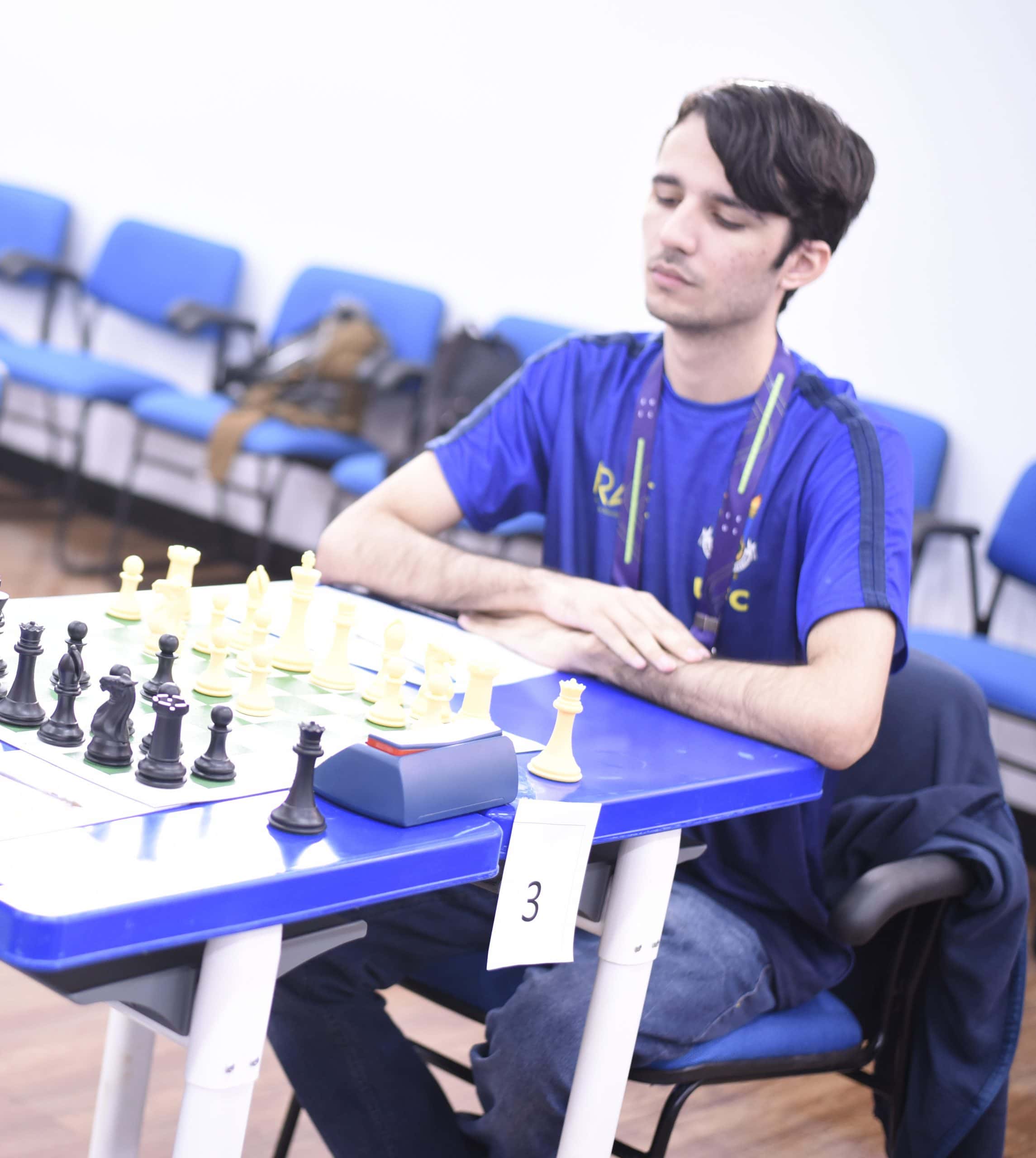 The light prevent us from even seeing the pieces! Man, I look so pale! In the game, I’m playing the powerful Queen’s Gambit!
The light prevent us from even seeing the pieces! Man, I look so pale! In the game, I’m playing the powerful Queen’s Gambit!
Playing another national event!
In this section, I’m going to talk about the experience at the JUBS 2022. I have to control myself, I have to restrain myself to avoid writing too much! As you know, the host city would be again Brasília, Brazil’s capital, I was going there for the third time, and all of them because of chess! Even though I knew a lot about that city, I felt I was going there for the first time! There was just a few things left to see, but two things I can’t never repeat: the experiences and the people. Everything would be brand new for me.
 Me at the Juscelino Kubitschek Bridge! It seems that I’m higher rated in tourism.
Me at the Juscelino Kubitschek Bridge! It seems that I’m higher rated in tourism.
In a short interview that I gave to my friends of another state, I was asked about my approach to the games, and my general feelings as the veteran member of my team. Well, it would be the same as the last year: keep the expectations low, this way I would be fine if things don’t go well and surprised if they do. Unfortunately, having the new 1965 FIDE rating also made me the 4th seeded in the event, meaning that I would face lower rated (though by no means weaker) players at the first boards, but I would try not to allow this get to me. To be honest, I always liked to be the underdog instead, it allows me to do my best with no pressure, but I definitely need to learn to play under the new conditions, I never thought that one day people would try to force a draw against me.
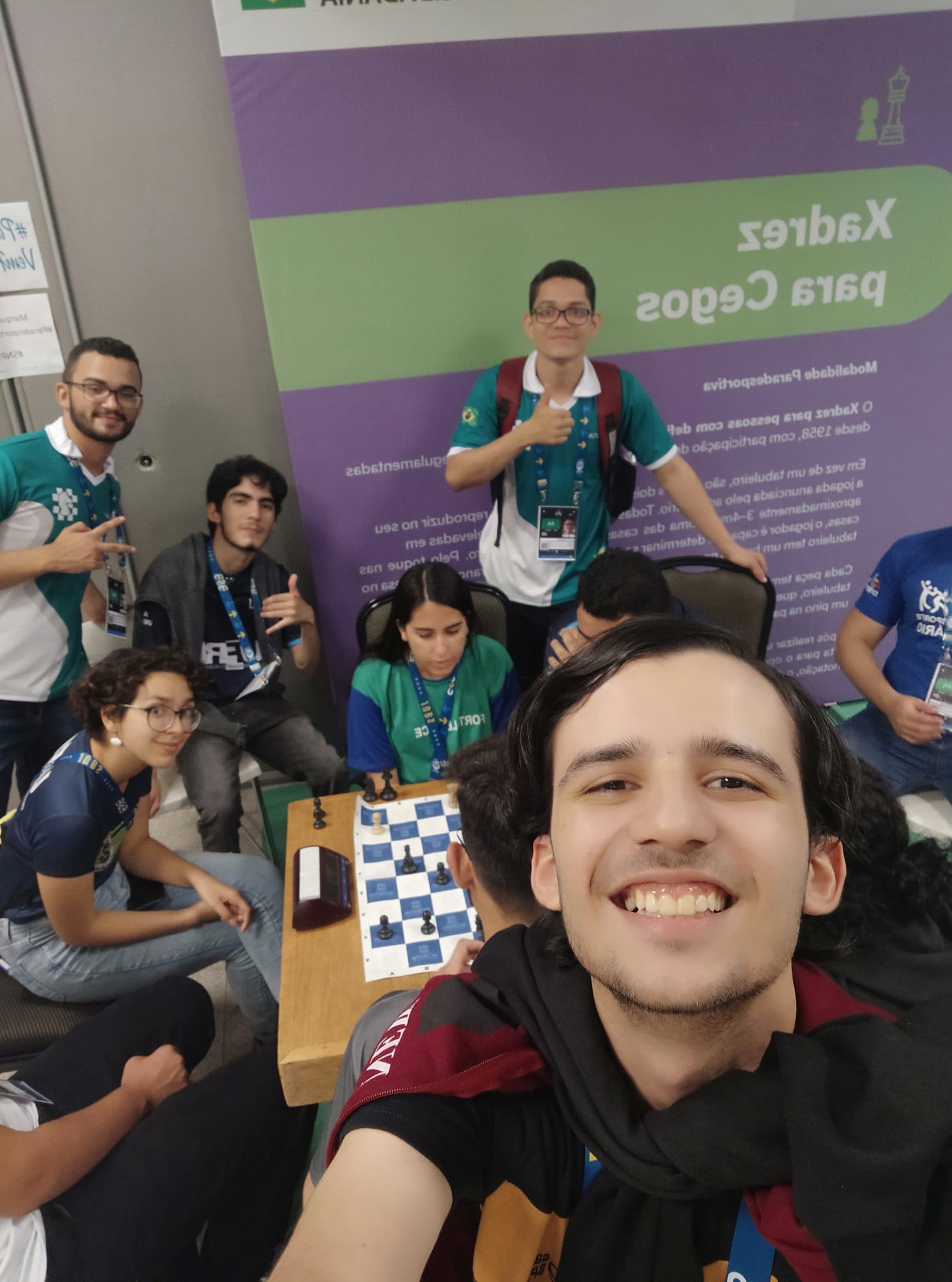 I have successfully defeated the blitz addiction! My friends, however, are still struggling! Jeziel, Cecília, Davi, Marina and Mateus!
I have successfully defeated the blitz addiction! My friends, however, are still struggling! Jeziel, Cecília, Davi, Marina and Mateus!
As a matter of fact, I was seeing this event as a way to train for the FIDE Zonal 2.4. A common pattern that I have observed in my OTB games is the lack of consistency and laziness in calculation, the latter often jeopardizing my chances in a couple of games. I wish I could blame the psychological aspect, but I usually just get nervous when I feel I’m winning the game. That until my next tournament, where I definitely felt my psychological composure falling. At the time I write this, I never had a coach, this makes things unnecessarily harder sometimes, I don’t have someone to tell me how to fix certain behaviors during the games, such as being excessively solid in positions where more active plans are required. Chessable author Andrew ‘LandyPJY’ Jeselson also suggested to me a technique called “seven ten seven rule” as a way to control my and breathing and the heartbeat. I was accepting every suggestion! I think it worked pretty nicely for me! If you want to know how it works, ask the man himself!
I arrived in Brasília one day before the beginning of the event, and my flight back to my hometown was scheduled to two days after the event was finished. I was invited by a friend to stretch my visit a bit, and that was exactly what I did! If I knew I would actually play in the FIDE Zonal 2.4, I wouldn’t have done that, because I would have a lot, A LOT of homework from my university to compensate the whole time I was out. Since I wouldn’t pay a fortune to accelerate my trip, I would enjoy it to the maximum! Carpe diem.
At Brasília’s Jardim Botânico! I love green areas so much! One day, I’ll have a house full of suspended gardens! Perhaps another house for cats and dogs too!
After some sightseeing, I went to my hotel. It was even fancier than the one I stayed last year! I have been treated so well, I had a life of a king for one week! Then slowly my old and new friends were popping up, and soon we were all hanging out! This time, we decided to choose a hotel and invite everyone from chess at once, regardless if we knew them or not! That’s how new friendships were made. Unfortunately, I’m not allowed to go deep into the specifics, but I can say that we all have a lot of stories to tell when we get older!
In a blink of an eye, the tournament began. I joked around that the worst part of a chess competition is actually having to compete, I treated the tournament itself as a formality, but not less seriously. I believed I had enough chess culture to compete against the best players of that tournament, but the question was if I had the skill, which is a whole another story. I should remind the reader that I lack experience in classical OTB play, a serious handicap that made me play excessively fast in the previous edition of the JUBS. Online and OTB chess are two very different creatures, and I’m still adapting myself. My overall goal in this tournament was to avoid making gross blunders, and if we are able to win something, that would be quite welcome!
One important thing I would definitely change: the paranoia with the openings! I made a couple of psychological mistakes by favoring openings that I don’t play that often, fearing preparation that didn’t actually exist, so I would be 100% predictable this time around. 1. d4 mainlines as White, Caro-Kann and Slav as Black. The Scandinavian was my sidearm, which I would unleash in case if I knew that my opponent would play a line versus the Caro-Kann I wouldn’t enjoy so much playing. The only little new surprise I intended to employ for sure was the Catalan, and I had a chance to do it! I hate to do opening preparation, and I preferred to leave this annoying task for the FIDE Zonal 2.4.
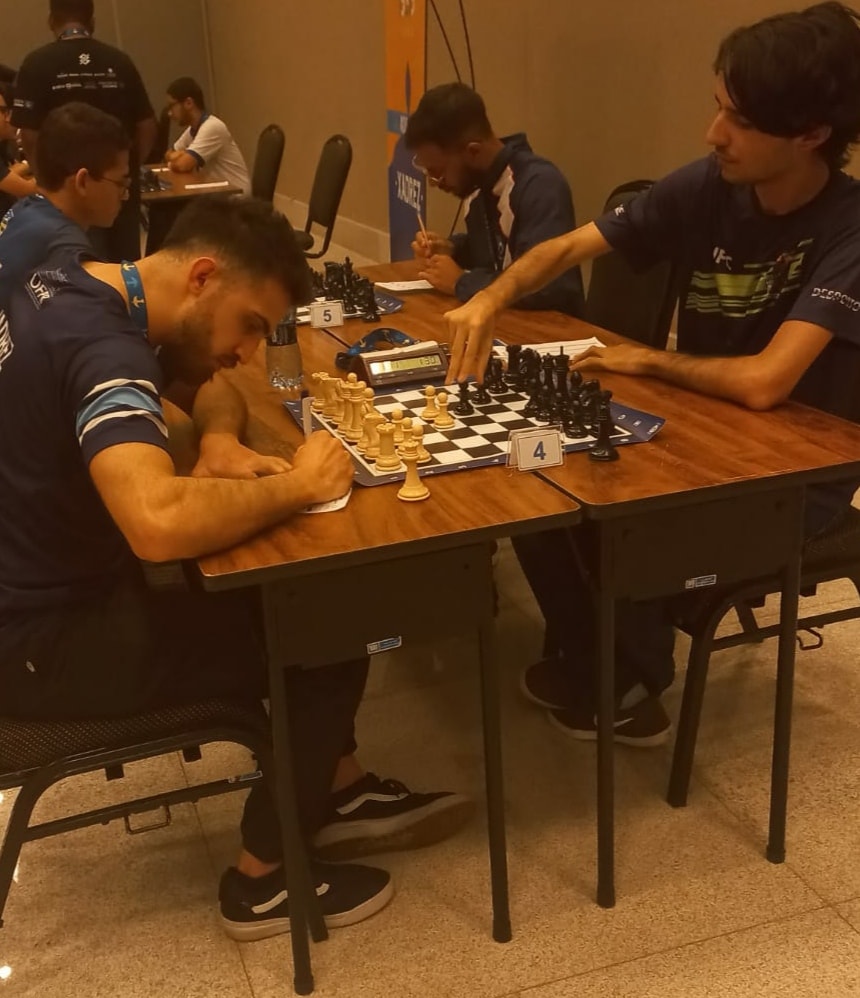 Playing my reliable Caro-Kann against Victor! It seems that my friend Alh forgot to clean up her camera, but that’s fine, I kinda like this cinematic Old West-styled filter!
Playing my reliable Caro-Kann against Victor! It seems that my friend Alh forgot to clean up her camera, but that’s fine, I kinda like this cinematic Old West-styled filter!
You guessed it, I analyzed and published my annotations of the tournament here: https://lichess.org/study/96vejwUZ. Yes, you guessed it again, I’ll share the “too long, didn’t read” version one more time! Ok, the first game I was paired with a player rated 1444 FIDE, and during the game, I felt he was totally underrated. I made only one serious blunder that could’ve costed me the game on the spot, but luckily it wasn’t spotted, and I went on to win in the endgame. The second game I faced an opponent rated 1722 FIDE, and he unleashed the Grunfeld! Due to a little opening trap, Black was lost already by move 13 (details in the study). In one moment I thought I lost my advantage, but I found a way to finish the game in 24 moves. In the third game, I faced a young NM who was among the favorites, and he played a very sterile line of the Exchange Slav. However, when the game was approaching a clear draw, I blundered a full pawn for no reason and had to throw the towel a few moves later. The fourth round was against a player rated 1707 FIDE and it happened in September 22, and because I lost the previous round in an unpleasant way, I decided I wouldn’t spend too much energy in this game and I would take the first repetition of moves I see. That was exactly what happened, the engine pointed out some potentially winning ideas in the position I drew, but the lack of fighting spirit in that day plus my birthday prevented me from having any regrets whatsoever. The fifth game I faced a very underrated player who was at 1817 FIDE, he employed the Fantasy variation of the Caro-Kann. I played natural looking moves in the opening and suddenly I was worse! At some point, I had a totally lost position, but the path to prove the win wasn’t that clear either, and somehow I was able to trade down to a worse ending that I managed to draw after 97 moves and four hours of play. The last game was a Catalan against a player rated 1692 FIDE, this time I got a very good position and I was never in danger of losing. I missed direct wins (like a two moves tactic that would win a piece) and I had to grind a win in the endgame, which kinda satisfied me a bit as I noticed the mistakes I made previously.
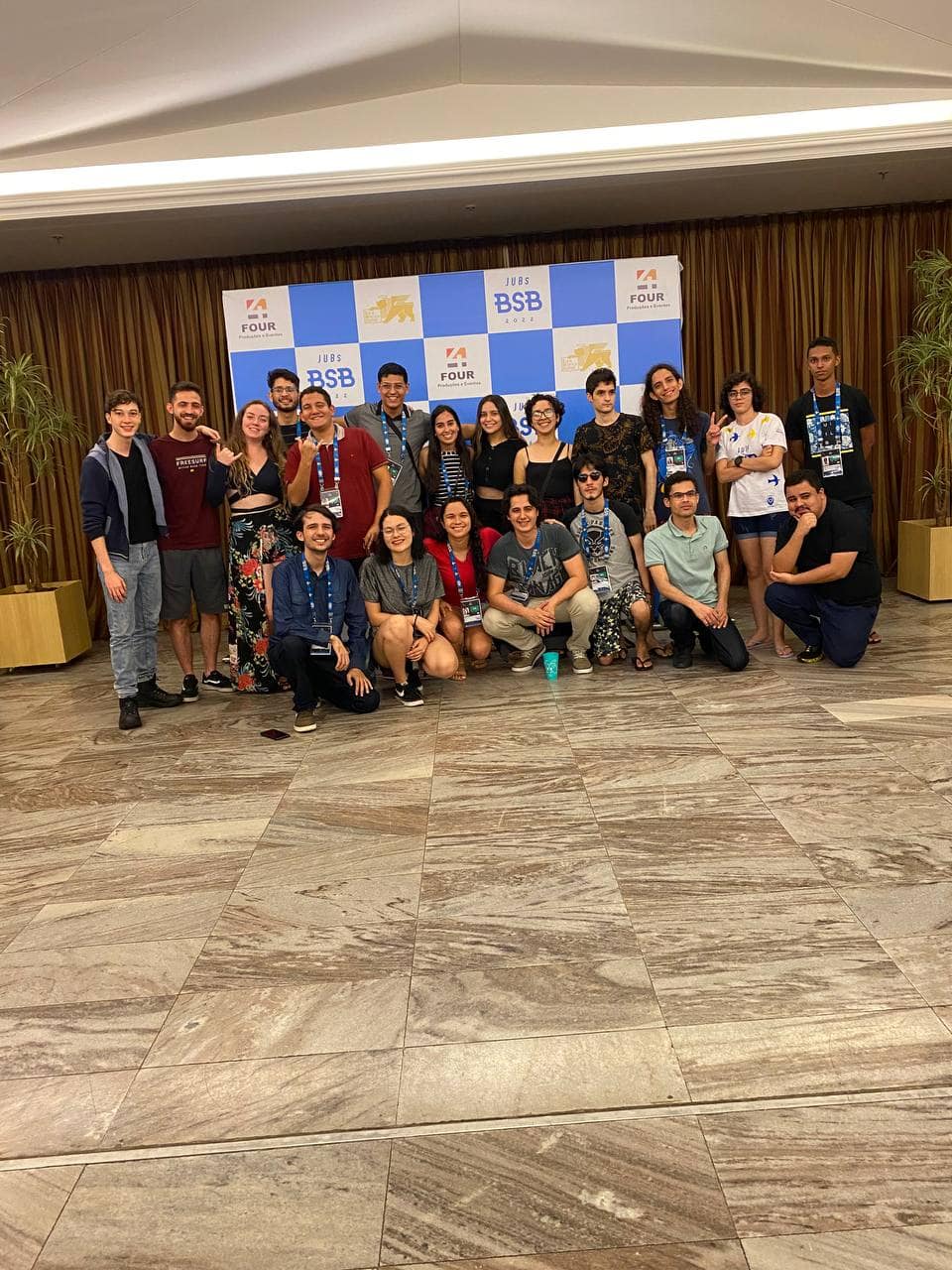 One more picture from all of us! Gustavo, Victor, Ellen, Lucas, Erick, Caic, Marina, Raissa, Cecilia, Alan, Helder, Lorrane, Henrique, Agatha, Jadiane, Arthur, Davi, Matheus and Márcio! What if we didn’t learn the rules of chess?
One more picture from all of us! Gustavo, Victor, Ellen, Lucas, Erick, Caic, Marina, Raissa, Cecilia, Alan, Helder, Lorrane, Henrique, Agatha, Jadiane, Arthur, Davi, Matheus and Márcio! What if we didn’t learn the rules of chess?
In the end, I finished with a solid 4/6 (+3-1=2), finishing again in the 7th place in the individual section. It’s funny because that was exactly the same performance I had in the last year edition, but this time I got 7th place in a field of 40 players instead of 30. Perhaps I can fight for the top 5 next time? We’ll see. As for the team event, unfortunately we dropped from 1st to 6th place, but we hardly felt about it, we knew the opposition would be stronger. With the tournament finished, it was time to slowly say goodbye to the people, especially when we remember I would be the last one to return to my home!
You might be thinking that is fun to have some extra time for some sightseeing and other stuff when you’re not in home, but it turns out this isn’t so cool when you’re alone. It’s so much better when you have people with you, you can talk with them, take pictures with them and share the marvelous experience together! But still, it was fun as it could get, I didn’t enjoy the trip less because of this. As you can see in the pictures, it’s impossible to be sad when traveling!
 This was the first time I saw a rhino in real life! At the same zoo, I also saw an elephant, a giraffe and a capybara for the first time! I was very thrilled!
This was the first time I saw a rhino in real life! At the same zoo, I also saw an elephant, a giraffe and a capybara for the first time! I was very thrilled!
The tournament ended, and after two days, it was time to go back to my place… but only for four days! Yes, I wouldn’t even have enough time to establish my normal life again, I needed to fill my luggage one more time! If you’re wondering how my routine would be after I return, well, I’m wondering that too, even after I returned! I wouldn’t be less excited, I knew I would have a chance to face a Grandmaster and even a win a title at once! If you’re wondering how it went, well, that’s exactly what I’m going to address now.
My first international event ever, and facing a GM there!
Remember when I said earlier that the FIDE Zonal 2.4 was officially announced by the end of July? Top GMs from South America were expected to come down to play, as it would give them the opportunity of fighting for a spot in the World Cup. I got very excited, as it would happen just 500 kms away from my home, it was just a relatively quick car travel. The event also would award titles directly, such as NM, CM, FM and IM. The International Master title would be awarded directly to the winner if he wasn’t already IM or GM, the FIDE Master for those who make 6/9, and FIDE Candidate Master to those who make 4,5/9 (the same requirement for National Master). The NM/CM title was what I aiming at for quite some time, as we know since my first blog post here. This might sound weird for chess players with where the game is way more popular, as the usual mprocedure is to reach the 2200 FIDE/national, but I have to make an important point: My first FIDE event ever was only five years after learning chess. Surely it allowed me to start out with a nice 1965 FIDE, but this lack of opportunity in all of those years has made unnecessarily difficult for me to improve, especially in practical play. One sin is the habit of playing a bit too fast and lazy calculation, which I’m still struggling to fix. Now imagine how I would grind the necessary rating to get the title, how many years would I take? If I never move away from my hometown, perhaps between five and ten years would be necessary to do it, and I’m not joking. I plan to move to a place better suited for my professional needs (completely unrelated to chess) and academic life, and at the same time, with more chess events to dive in. Until then, I would need alternatives, and the possibility of becoming titled at once caught my attention.
 Ponta Negra beach, the place where the FIDE Zonal 2.4 was held. Imagine getting up during your game to relax and have this view!
Ponta Negra beach, the place where the FIDE Zonal 2.4 was held. Imagine getting up during your game to relax and have this view!
However, it didn’t take long to see my excitement dissipating; the entry fee was R$ 1000 or U$ 200, at the player’s choice. I was surprised with this pricing, as it’s in South America and no one here earns in american dollars. Would be the event accessible only to those who could pay? Some friends from Europe told me that this was the regular price of big open events, but at least in that case most people could afford to play if they do some savings. I got a bit sad at first, but I moved on… until some people started to talk about it again! This gave me the so much needed boost to make me think about alternatives, then I remembered that Chessable is an amazing company and community that has helped me a lot in the recent past. Maybe the entry fee is not accessible for a university student like myself, but it was for them, and I decided to bring the idea to the Chessable and Play Magnus group people – they were all happy to help me, in particular, Matt O’Brien, he was ultimately the responsible for approving my participation in the FIDE Zonal 2.4! For that, I’ll always be grateful!
I did mention the possibility of getting a title at once, but I told them that I couldn’t promise anything, due to my limited experience in classical OTB play. They were totally fine with this, and they didn’t ask me for anything related to results. The only thing I could do was writing a follow up to my previous blog post, which warmed my heart, especially after I read so many positive comments from the Chessable community! I’ll leave my “thank you” message to the end of this post, for now I want to talk about the experience in the tournament.
 I only had time for some sightseeing in the last rounds of the tournament, but hey, I tried to make the most of it! I couldn’t hide Chessable’s hand in all of this!
I only had time for some sightseeing in the last rounds of the tournament, but hey, I tried to make the most of it! I couldn’t hide Chessable’s hand in all of this!
Once I got my name in the tournament list, I had to prepare my trip. Luckily, a NM from my state, a businessman who won the state chess championship nine (!) times, decided to play as well, and he generously invited me to go with him for free! But I still needed to see where I would stay, I was more or less counting with my friends from Natal, when Italo (also a Chessable user) gave my name to a lovely family who lived there, and they simply decided to literally adopt me for a whole week! Seriously, I never had such an amazing welcome committee as I had there! We had the chance of talking a lot throughout the week, and they were genuinely worried with the tournament and did their best to improve my confidence. I’ll always remember their kindness!
I arrived in Natal by the evening of 10/02, and I was too tired for sightseeing, so I decided to take a bath, eat a bit, and go sleep. The following day, I went to the hotel where the tournament would happen, and the first chess player I see is GM Darcy Lima, the first GM I see in real life! He was quite humble and kind, and often referred to other people as “masters”, a habit that is seen more between us mortals. After reaching the tournament hall, I see another GM, Alexandr Fier… who would be the first GM I would play in a real chess board! I discovered that a couple of hours later. Well, Fier wasn’t much of the talking type, I even wondered if I needed to be 2400+ FIDE in order to conduct a formal conversation with him, but in the end I concluded it was just his way of being, he was nice to me after our game ended. After a while, I saw some of my old friends and met new people, including players from Bolivia, Ecuador and Peru! I had to talk with them in English, because I don’t speak Spanish, and I felt so embarrassed by this that I set a goal of learning Spanish properly for the next time I see them. My current Spanish knowledge is only reading and hearing, as it’s similar to my native language, but I have some serious work to do.
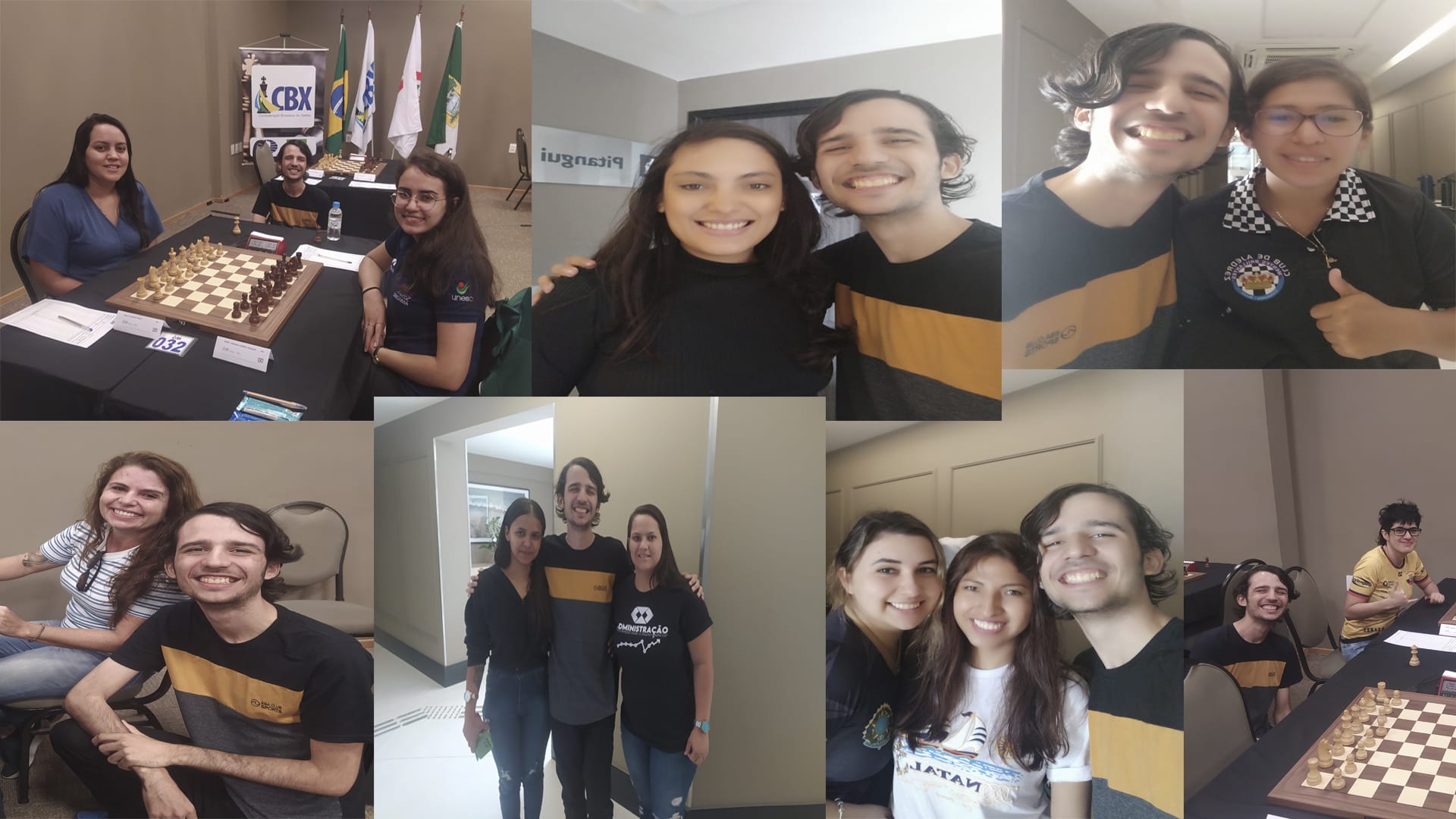 Some of them I already knew, others I met that week! I promised that I would, and I WILL, learn Spanish properly! Carolina, Kathiê, Renee, Jessica, Claudia, Cibele, Gabriele, Thauane, Maria Eugenia and Carla!
Some of them I already knew, others I met that week! I promised that I would, and I WILL, learn Spanish properly! Carolina, Kathiê, Renee, Jessica, Claudia, Cibele, Gabriele, Thauane, Maria Eugenia and Carla!
Anyway, now let’s talk about the games, I know you have been waiting for this! I already gave you a spoiler, I was paired against GM Alexandr Fier (https://en.wikipedia.org/wiki/Alexandr_Fier) in the first round! How lucky I am! The bad news is that I would need to make 4,5/9, so my road to the title would be tough already from the first game. I was warned that GM Fier played impressively fast, being able to wipe out very strong opposition by using only the increment, and he played quite FIERless… sorry, I couldn’t resist! So yeah, a “boring” chess player like myself is often the antidote to hyper aggressive players, and vice-versa, my goal would be to last more than 25 moves and avoid ending up in famous Youtube chess channels by being a victim of Fier’s enterprising chess. Did I succeed? Let’s see! By the way, my best result against a Grandmaster at the time of writing was against Chessable author GM Alex Colovic, in a Lichess simul (https://lichess.org/bETZtGyf), I did accomplish my goal of surviving the first 30 moves there and I even drew with him! Before continuing with the text, you can check my Lichess study where I analyzed and annotated all the games of the FIDE Zonal 2.4, feel free to check them out here: https://lichess.org/study/qQBCMfT7.
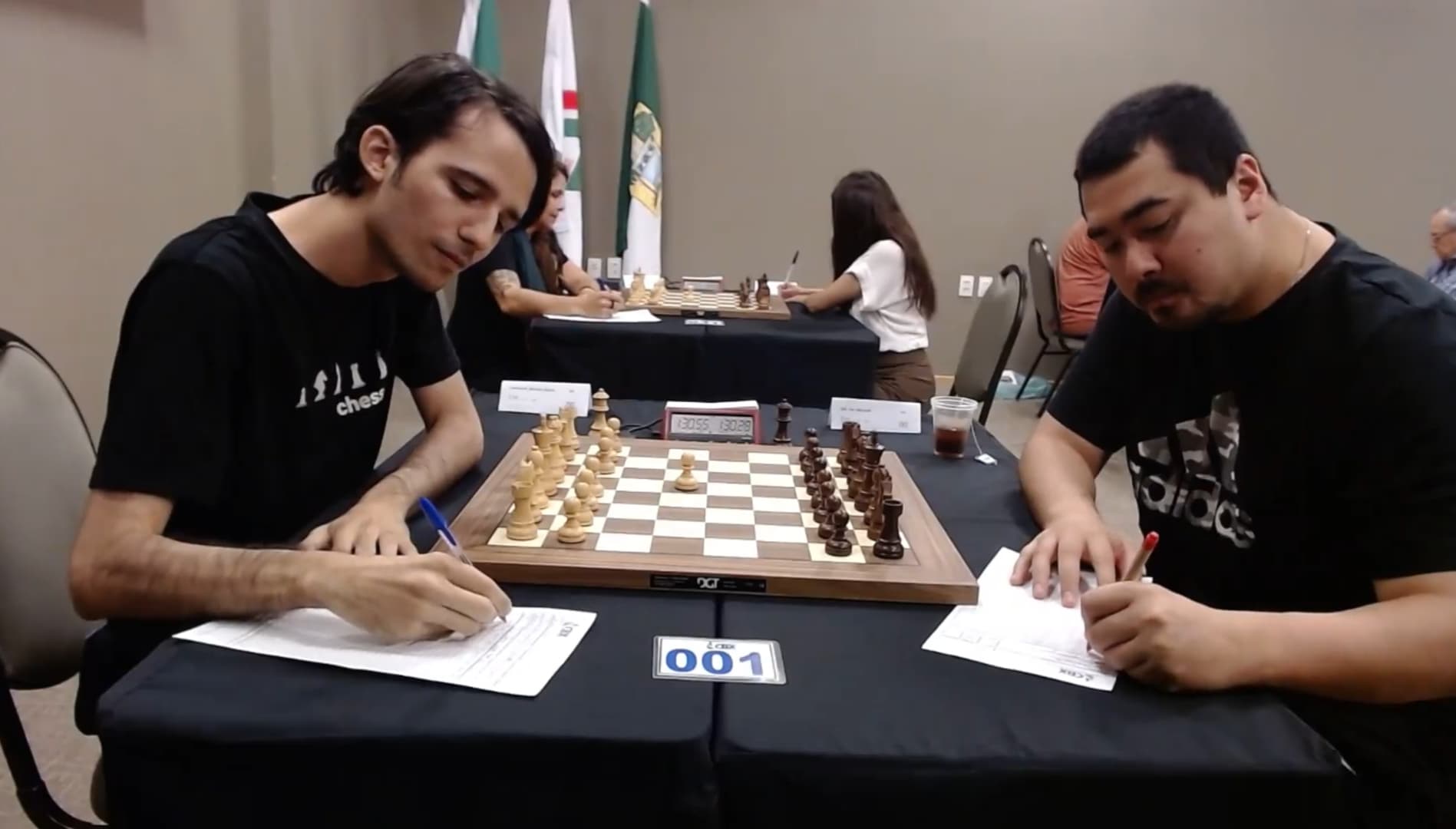 Facing GM Alexandr Fier, I tried my best to avoid smiling! Playing my reliable 1. d4!, best by test, as Fischer wisely said. I was happy in having the opportunity of showing Chessable to everyone already in the first game!
Facing GM Alexandr Fier, I tried my best to avoid smiling! Playing my reliable 1. d4!, best by test, as Fischer wisely said. I was happy in having the opportunity of showing Chessable to everyone already in the first game!
I looked at Fier’s games on Lichess and noticed that the Benoni defense was by far his main choice, implying that’s his weapon to bust the humble U2400 FIDE players. I was deciding which line I would employ to reduce potentially tricky middlegames, and I knew the perfect choice: 1. d4 Nf6 2. c4 c5 3. d5 e6 4. Nc3 exd5 5. cxd5 d6 6. h3 g6 7. Nf3 Bg7 8. e4 O-O 9. Bd3 b5 is the mainline, and here I intended to play the infamous 9. Bxb5 line (9. Cxb5 is the move to fight for an advantage, and where White scores well), where it often goes like this: 10… Nxe4 11. Nxe4 Qa5+ 12. Nfd2 Qxb5 13. Nxd6 Qa6 14. Nc4 Nd7 15. O-O, and as you can see, this is extremely drawish. I wanted to see how Fier would grind me down from here, and I knew that my best chance against him was playing where I was stronger, I wouldn’t have nothing to gain from tactical melees against such a sharp and competent player. At the very least, I would have an endgame masterclass for free. Well, it seems that he read my mind, he went for a very offbeat line, keeping the drawing chances away for making him considerable worse out from the opening.
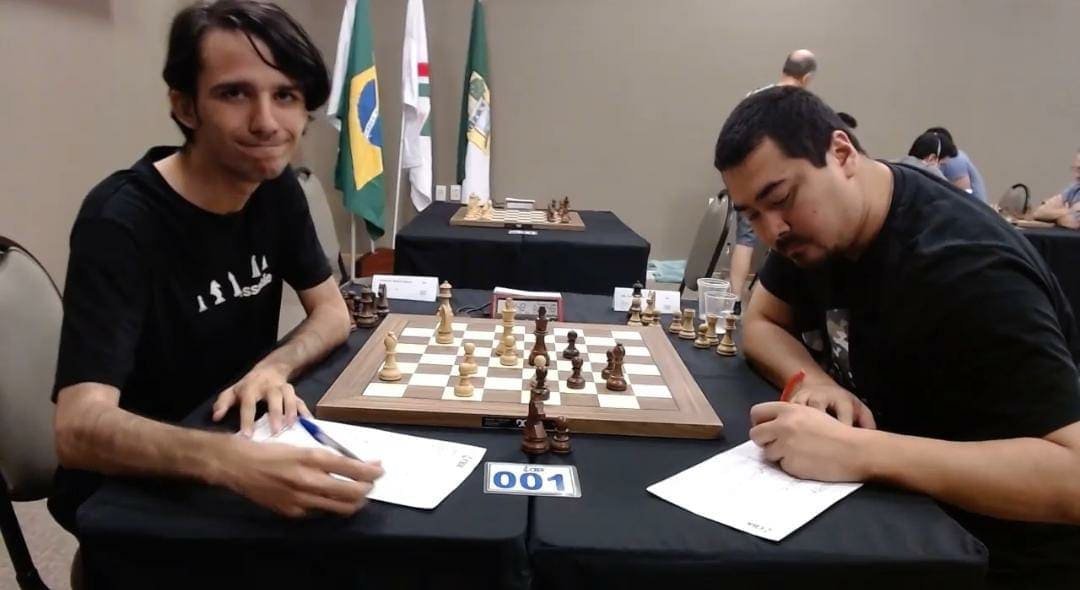 The Office fans will get the reference! I looked at the camera after resigning, and my face says: “Hey, I lost, but that’s more than ok!”
The Office fans will get the reference! I looked at the camera after resigning, and my face says: “Hey, I lost, but that’s more than ok!”
I must say I’m quite proud of my game, I think I convincingly punished him out from the opening, and he was close to lost already in the early middlegame! I’m as surprised as you! As you’ll see in my notes to the game, I concentrated myself in locking the position down, I was focused in preventing his active plans, but this made me miss my own active plans. There was a key moment in the game that I had to play for a pawn break (f4 push), opening up the position for my far better placed pieces. After missing that idea, I could still play it several times later, but it was more and more trickier to calculate deep into the craziness. Some kibitzers from my state were like “oh, I would’ve played f4 a long time ago”, “Adriano lacked experience”, “Adriano is tilting”, “How Adriano fails to defeat Fier with such a winning position?” etc., and I have to say that I was absolutely calm in that game, which can be confirmed by seeing the Youtube transmission (https://www.youtube.com/watch?v=aqfMcLUyjO0), and that I find far too easy to be at home and seeing the engine’s suggestions and say how “easy” the win is. It wasn’t one or two moves that I needed to find, I needed to find a sequence of moves and a plan, something that no one in the chat came up with, which means that one needs to stop looking only at the first move of the engine’ suggestion. I wasn’t used with people calling out my mistakes like this, but maybe this means I’m growing strong enough to get some attention, which makes me quite happy!
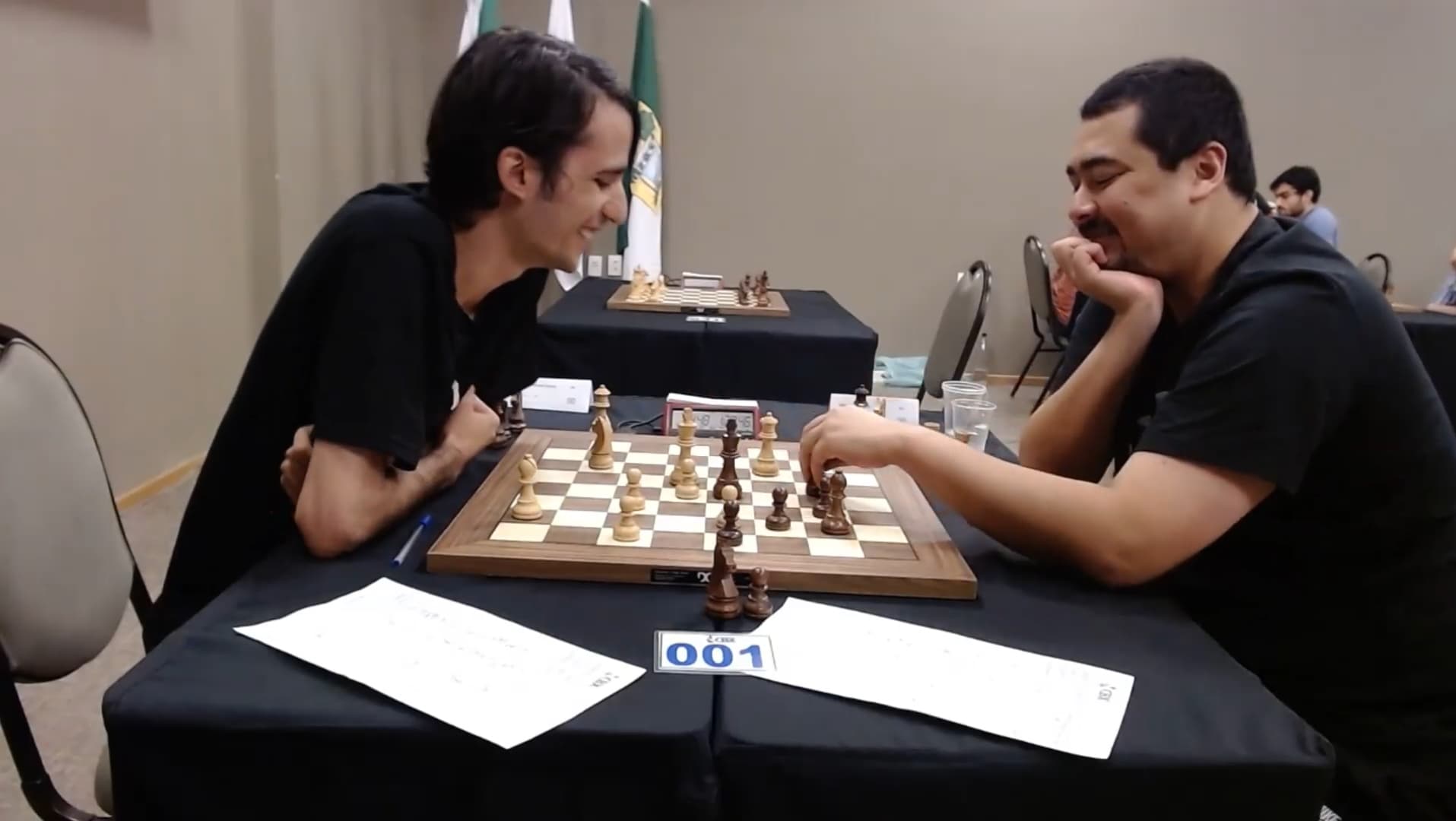 Yes, it seems that I was able to tell a good joke and made him laugh! What did I say? In the picture, Fier was showing me some of the important ideas that I missed that could’ve made him struggle way more to claw his way out of his difficult position.
Yes, it seems that I was able to tell a good joke and made him laugh! What did I say? In the picture, Fier was showing me some of the important ideas that I missed that could’ve made him struggle way more to claw his way out of his difficult position.
The reader could be imagining the feeling of facing such a phenomenal player, if I was nervous and so on. To be honest, that was the only game in the whole tournament I was completely relaxed, and I did a very good job there. I was actually trying to prevent myself from smiling too much, it wasn’t even because of the game itself, but having the chance of playing in board one with such a fancy chessboard (I always wanted one of those non-electronic DGT chess sets), having my name in a little card, having the famous GM to write my name – he wrote only our last names in the scoresheet, though – and you know, the camera. I often looked at the camera, and I even threw a Jim’s face when I resigned, something that only The Office fans would recognize. It didn’t even cross my mind the idea of actually defeating Fier, or even drawing him, as matter of fact the result never went into consideration. I have to learn to keep this level of concentration more often!
After that game, it was time to hunt down those 4,5 points. This tournament is one of the rare where I would play for results above than anything else. As I stated in my first blog post, and pretty much everywhere else, I kept playing chess so I could have chances of visiting new places for free and meeting the marvelous people out there, and seeing some old friends on the way. Even though it’s a hobby, I don’t take the games less seriously, but I do try to play without pressure. Here I decided to put pressure on myself, which definitely affected me in a negative way. I’ll share with you some of my experiences dealing with the pressure, and my own advice for the self-improvers out there. Don’t let subjective factors get in the way of objective goals!
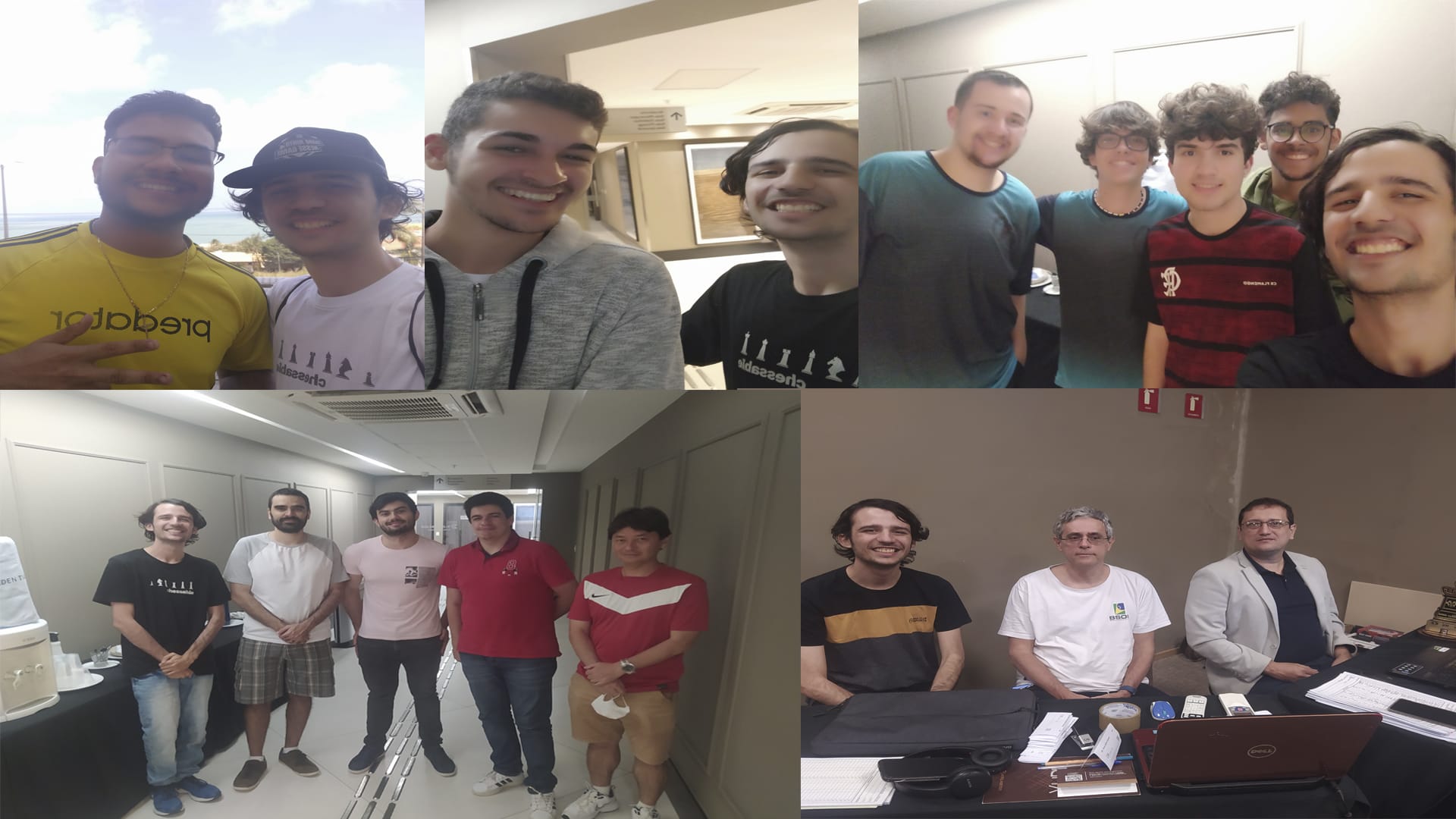 The boys! Alexsandro, Enzo, Pedro, Matheus, Kauã and Vitor are in the first row. In the second raw, we see IM Roberto Molina, GM Evandro Barbosa, GM Renato Quintiliano, GM Everaldo Matsuura, GM Darcy Lima and IA Igor Macedo.
The boys! Alexsandro, Enzo, Pedro, Matheus, Kauã and Vitor are in the first row. In the second raw, we see IM Roberto Molina, GM Evandro Barbosa, GM Renato Quintiliano, GM Everaldo Matsuura, GM Darcy Lima and IA Igor Macedo.
I’ll do another “too long, didn’t read” version of the games, you can always check the study with more detailed commentary that I have shared above. Ok, so the first game I got paired with a player rated 1664 FIDE, and after I got a slightly worse position on move 13 by messing up the move order of a Reversed London, my opponent offered a draw which I declined. When I got what I considered a bad position for me, as I was a pawn down but had enough activity according to the engine, my opponent again offered a draw and I decided to take it. The second game I faced a NM rated 2114 FIDE, I employed a Catalan and got a better position out from the opening, an advantage that grew to a huge positional advantage – in two moments, my opponent offered me a draw when we both knew he was close to lost, so I declined them. After several inaccuracies in the late middlegame, we reached a balanced ending where I simply allowed my rook to get trapped for no reason. This loss got into my head for sure. I won the third game with ease against a player rated 1449 FIDE, in a Caro-Kann endgame. The fifth game was a tragedy, I was White against the Grunfeld and I got hit by “home prep” (which never happened with me in an OTB game), and despite this, my opponent made a serious tactical mistake that I failed to exploit because I believed I was still in his preparation, then he got a great position and I went on to lose a miniature.
Before continuing commenting the games, here I want to comment about my own psychological state after the loss in the fifth round. I got extremely depressed, seeing my opportunities flying away so easily, my newly established FIDE rating bleeding, and facing the reality that I was up to the very difficult task of scoring three points out of the last four rounds – in fact, I was already considering that task pretty much impossible, and I was contemplating withdrawing that tournament. That’s exactly what you read, I seriously considered leaving the tournament! I know that all of my friends were with their best intentions, but I was quite unhappy with comments like “don’t be pessimistic”, when my situation was indeed quite bad and pretending to be happy wouldn’t change the difficulty of scoring those three points. For me, the worst part of stopping playing would be explaining to the people who supported me why I would be such a “defeatist”. However, after some time, reading and hearing all the positive messages, even from people who didn’t know what was going on that tournament, subtly filled me with confidence! No, I’m not telling you a “novel” or something like that, this actually happened! Out of nowhere, I became more confident, I shrugged off my bad feelings and decided to keep fighting. I would prefer to fall shooting than leaving like a bad loser. Don’t get me wrong, I still considered 3/4 something difficult to make real, but what else could I do? I even remembered super GM Ding Liren, who had a bad start at the 2022 Candidates Tournament and simply exploded to the second place, which in the future would give him a chance of becoming World Champion! Giving up now? No way!
 Just chiling! We even brought a friend of ours to our little gathering by using a phone! Davi, Alexsandro, Marcio, Raissa, Emanuel and Giovanni.
Just chiling! We even brought a friend of ours to our little gathering by using a phone! Davi, Alexsandro, Marcio, Raissa, Emanuel and Giovanni.
In the sixth round, I faced a man rated 1655 FIDE, who looked to be at his late 60s. He was an avid fan of the Botvinnik English, which made me think if he was aware of Simon Williams/Richard Palliser course on Chessable. Well, my 1… c6! prevents him from having his favorite setup, so we’ll see what in had in store. He played 2. e4, and voilà, I was again playing the Caro-Kann! After a suspicious opening play from his part, I got a healthy position which eventually allowed me to win a clean exchange before move 30, I thought I would leave the tournament hall quickly, so I lowered my guard… and he found very good ways to pose me practical problems, notably by throwing his kingside pawns and forcing me to play accurately to keep my advantage. The game lasted 62 moves and five hours of play, an intense fight that motivated me for the next round. Was I recovering?
Well, in the seventh round, I faced an extremely underrated 15 y.o. kid who was at his 1549 FIDE – he had several NM and FM scalps in classical OTB play! Well, I wouldn’t let him take me down, and seeing that he was a Grunfeld fan, I decided to play an opening that I’ve never played before: the London system! Yes, that’s what you read! Even I can’t explain exactly the reasoning behind that crazy plan, perhaps because there was none. I just thought it would be a good idea to catch someone by surprise! Of course, I did check his games and I was also betting that my knowledge with the Slav/Reversed London structures as Black would give me some kind of home field advantage. This turned out to be true, the opening phase was a huge success for me! Unfortunately, due to some minor inaccuracies and one major miscalculation, I allowed Black to equalize. When he was starting to fight back, he blundered a full exchange, a win that I can never be proud of. But still, I definitely should think about the London one day, but I find the Catalan so much more beautiful!
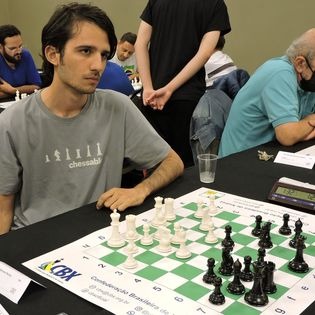 I did pose for the camera! Someone sent me this picture in its poor quality version, and I’m relieved with this, it’s very difficult to see the London system on my board! The worst part for me was when GM Darcy Lima looked at my board when I played 3. Bf4 😀
I did pose for the camera! Someone sent me this picture in its poor quality version, and I’m relieved with this, it’s very difficult to see the London system on my board! The worst part for me was when GM Darcy Lima looked at my board when I played 3. Bf4 😀
Ok, so now I needed one point out from two games, this is far easier than three out of four. Fearing that our last opponents would refuse a draw, my opponent and I played for the win. He decided to employ the infamous Exchange variation against my dear Slav defense, and already by move 20 the game was dead equal! We were (correctly) afraid of forcing an equal position for no reason, so we just repeated moves and a draw came. If I needed to play for a win in the last round, at least I would have the White pieces. Guess what, I faced someone who also was at 4/8, so I offered a quick draw and he just accepted it! I have been criticized for doing this, because it costed me rating and it was against the “philosophy of chess”, but it seems that some people failed to take my reality in consideration, I wouldn’t have another chance to a direct title anytime soon, there was no need to pull out a Fischer by trying hard. I felt very justified when WIM Kathiê Librelato offered a quick draw against a considerably weaker opponent in order to secure her spot in the World Cup – who cares about rating anyway?
 I did accomplish a major goal in my chess career, but I’m not relaxing or fully celebrating yet; I have more work to do, there is some grinding and perhaps more opportunities to travel to go after! Now as NM Adriano, how cool is that?
I did accomplish a major goal in my chess career, but I’m not relaxing or fully celebrating yet; I have more work to do, there is some grinding and perhaps more opportunities to travel to go after! Now as NM Adriano, how cool is that?
Yes, I did it, I became National Master! After five years and a half playing chess, I finally attained one of my highest goals! As an extra, I also became eligible to the Candidate Master title, which FIDE will award me the moment I cross 2000 FIDE. It shouldn’t take me too long until have both titles under my wings. But I have to be honest with the reader, I considered my play somewhat unconvincing, I played below my potential, and this made me think if I deserve those titles or not. The answer? It’s actually in the future! What I did in that tournament doesn’t matter anymore, it’s what I’m going to do in the future what matters! Yes, I want to justify the newly attained NM title, I’ll play more tournaments, I’ll work even harder on the game, I want to raise my skills to a level of a strong titled player! That’s basically my motivation, and at least I won’t be hard pressed to pursue the NM title anymore, I can simply relax and try to do good games. As I said in the previous blog post, what will dictate if I’ll pursue the FM title or not is my own personal life, especially my academic life; if I feel that I deserve the title and if I have time to do the grinding, I’ll definitely do it! It’s soon to think about it, so let’s enjoy the moment!
I also wanted to congratulate a friend of mine, Alexsandro de Lima, who was still a NM and had the tournament of his life; he defeated GM Evandro Barbosa, IM Diego Di Berardino (GM strenght) and drawing GM Darcy Lima. He almost got a spot in the World Cup! He made 6,5/9 and soon will be awarded the FM title. Not everyday you get such a performance!
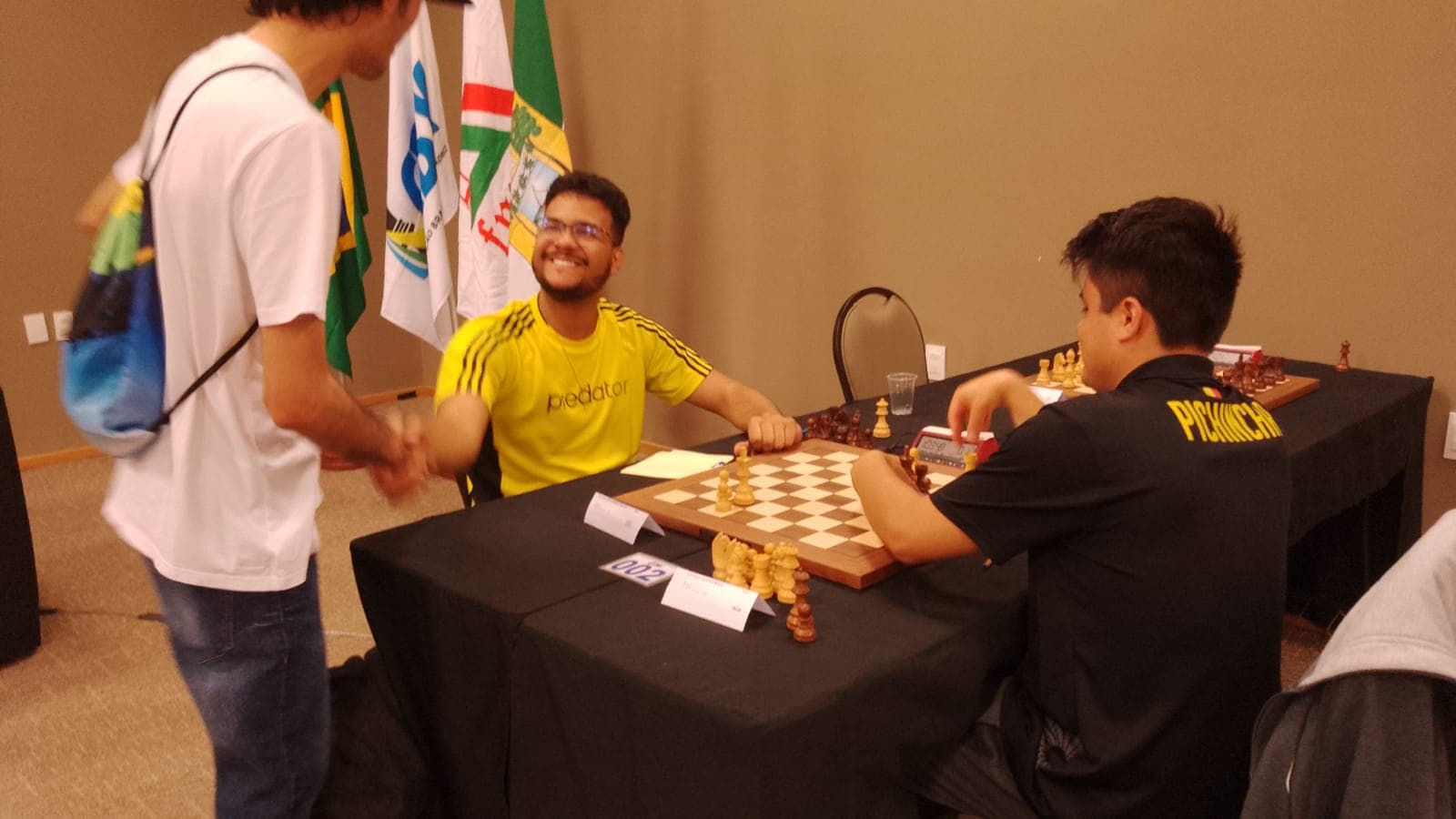 In the picture, we see my friend NM (now FM) Alexsandro Lima in the middle, who got the draw he needed against Bryan Carrasco from Ecuador. I was the first one to congratulate him, what a honor!
In the picture, we see my friend NM (now FM) Alexsandro Lima in the middle, who got the draw he needed against Bryan Carrasco from Ecuador. I was the first one to congratulate him, what a honor!
The future and a message to the Chessable community!
What comes next? As I said, the only certain thing I’m going to do is to try to play more tournaments so I can bounce back with my FIDE rating, and also to justify my newly acquired title. There is no FIDE tournament in sight available for 2022, but there is a big open event in late January in the south region of Brazil, which I’ll try to play. Meanwhile, I’ll take part in local rapid and blitz tournaments, where I’m usually at home – I even won the state blitz chess championship in 2021, perhaps I can try it again?
I’m also putting my routine back together. Imagine the mess you can create in your normal life when you’re away from your home for almost three weeks straight! I’m pursuing a teacher degree, and I’ll consider going after a master and doctorate degrees if my personal life allows me to do so. I’m also planning to move away from my hometown, so I can have more opportunities related to both my academic studies and chess, as I said earlier. One thing at time!
For the rest of the year, I plan to rest a bit, but I already know in what I have to work in the chess part, notably calculation, as I feel that the superficial play versus concrete play is what can make a player weaker or stronger, regardless of his/her previous work in the game. I’ll also consider hiring a coach the moment I get a stable income, as working alone can be quite difficult sometimes. Being self-taught means that I’m entirely responsible for my victories, but also for my defeats, I need to swallow everything without complaining… but not at all! Only in the game of chess itself you’re in your own, there is no need to isolate yourself from other people. In fact, the road is far easier when you’ve their moral support. You have the right of being a bit unhappy if things don’t go your way, but don’t let this control you, the good things will outweigh the bad ones.
I would like to bring back a quote that I have shared in my previous blog post: “Chess can be an individual game, but I was never alone!”. As you probably noticed, I decided to mention the people in the pictures above by their names this time, and I also brought a humble spreadsheet with no less than 52 names/Chessable usernames from people who have directly or indirectly helped me in this journey, each in their own different way, albeit it’s still a quite small list. There are several people who cheered for me anonymously, I hope this whole text represents my happiness with all of this! I will be more than happy to update the spreadsheet as the time goes by!
| “aypapi” | “hubskrt” | Alex “Chessforlife” Belsley | IM John Bartholomew |
| “BelgianDood” | “InfiniteFlash” | Andrew “LandyPJY” Jeselson | IM Yuriy Krykun |
| “Benner” | “MakkaPakka” | Anthony “CalculatedChess” Beatson | Italo “mininDeOuro” Leite |
| “cj17” | “MuZero” | Arya “BrightestNight” Bhakta | Jan Willem |
| “d4player” | “NoTakebacksHmm” | Austin “Austin_C” Connor | Maik “Feingeist” Naundorf |
| “DanishPlayer” | “tombee” | “NielsWe” | NM Braydon “bpovo1394” Povinelli |
| “deepakbisth” | “paradox” | FM Kamil Plichta | NM Francesco “fdunnechess” Dunne |
| “DiscipleChess” | “Philipp87” | Gia Huy Banh | Renato “torrubirubi” Bender |
| “Fixou” | “PixelatedParcel” | GM Alex Colovic | Sam Cicero |
| “flyingbishop97” | “thebaron” | GM Àlvar Rossell | Sean “Ducky” Lee |
| “GoldJackal” | “Vatbrain” | “Aokiji” | Wendell “vvendel” Barbosa |
| “Hermione117” | “WeilunPotter” | IM Christof Sielecki | WFM Lesly Montufar |
| “Gameborn” | “TheSicilianRoullete” | “RandomJSDev” | “Coach_K” |
And also a big thanks to the whole Chessable staff, in particular David Kramaley, Matthew O’Brien, Suman “Ron” Chatterjee and Gabriela Kormann, they worked behind the scenes since last year to make all of this possible!
I know this a fairly big blog post, I’m writing a lot, but even then I don’t have enough words to describe my gratitude towards the whole Chessable community. I wonder how different my life would be if I didn’t stop a few minutes to learn the rules of chess back in 2017… I hope chess brings you many marvelous things as it brought to me! Thank you for following in my journey, and an even bigger thank you for reading this far! I’m looking forward to see what comes next!
EXTRA: Some Chessable courses that I recommend!
In my previous blog post, I shared a list of recommended books, and this time I’ll share a list of my recommended Chessable courses. You can include on this list every book that I mentioned before that is available on the platform. I have plans to update this list at some point, as I have no doubt there are several hidden gems that I didn’t look at yet.
IM John Bartholomew’s 3… Qd8 Scandinavian | IM John Bartholomew
One of my first Chessable courses ever, it has a special place in my heart. I joined #TeamScandi with this. I have used the 3… Qd8 Scandinavian in OTB games, often with good results. One important fact about this opening is that I have a very high drawing rate with it on Lichess, due to my frequent blunders in the endgame, like failing to hold drawn endgames and to convert winning ones, and this made me to work harder in the endgame later on.
100 Endgames You Must Know | GM Jesus de la Villa
An obvious follow-up. This course was insanely difficult for me at first, I realized how little I knew about chess. But I didn’t give up, after completing the course a couple of times, I slowly dominated it, and now I consider it relatively easy to study. Only the Rook and Bishop vs Rook I still struggle to make progress, so I’m just hoping I’ll not face in an OTB game anytime soon. A great book, I recommend it to a wide range of strengths.
Lifetime Repertoires: Caro-Kann | GM Erwin L’ami
The Caro-Kann is my top choice against 1. e4, and the first time I played it I was rated around 1200 on Lichess. I did play several other openings, but this is the one that I relied on the most. This course was a natural choice, and it’s quite comprehensive, quickly becoming one of my all-time favorite Caro-Kann materials. In my opinion, this the “Oracle” for 1. e4 c6, solid as a rock! 4… Bf5 and 4… Nf6 are covered, and a little idea that I gave to the author was to consider adding 4… Nd7 at some point, making Karpov proud! Maybe one day.
Lifetime Repertoires: Chebanenko Slav | GM Alex Colovic
Against 1. d4, I didn’t have a beloved opening from my early days on chess. I played pretty much everything, and my favorite was the Nimzo-Indian, which I dropped because I didn’t know what to do against the Catalan/1. d4 systems/flank openings. I have played the Classical Slav due to John Bartholomew’s influence, and after exchanging emails with GM Alex Colovic to see what 4… a6 was about, I decided to give it a shot and… I have been playing it almost religiously to this day. Pretty much bulletproof, I rarely lose out from the opening, I trust a lot in this course. I also consider seriously in adopting the “Lifetime Repertoires: Queen’s Gambit Declined”, from the same author, as it’s another reliable choice against 1. d4.
Chess Endgames for Kids | GM Karsten Muller
I was selected to beta-test this course, and due to its name, I underestimated it. How wrong I was! It’s a fantastic book, I consider it an easier version of ‘100 Endgames You Must Know’, which should be quite good for less experienced students. It teaches more advanced concepts in simpler ways, at least simpler than in other endgame materials I have seen. For starters, even the Queen vs Rook endgame is covered! Definitely not only for kids!
Lifetime Repertoires: Shankland’s 1. d4 (Parts 1, 2, and 3) | GM Sam Shankland
Those were tough to get, but given that only Shankland recommended my preferred 1. d4 Nf6 2. c4 e6 3. Nf3 move order, I gave them a shot. A very wise choice, Shankland’s pragmatist approach in the opening pleased me a lot, and my results with the White pieces increased exponentially. I recommend this for those who want a long-lasting 1. d4 repertoire without changing the lines often. Perhaps if I followed Shankland’s recommendation against the Grunfeld I wouldn’t lose a miniature as I did in one of the games at the FIDE Zonal 2.4.
Mastering Chess Strategy, Mastering Endgame Strategy, and Mastering Opening Strategy | GM Johann Hellsten
Hellsten’s trilogy is fantastic, and my favorite is by far Mastering Endgame Strategy. The author goes for an exercise-based approach, meaning that hard work is necessary. I have enjoyed a lot going through them, and if you’re an ambitious player, you can’t go wrong with those. They are fairly challenging, but they don’t get to the borderline unsolvable point. It takes time to complete the books and to apply what you learned in your games, so be patient.
The Checkmate Patterns Manual | Raf “CraftyRaf” Mesotten
I have been considered “too advanced” for this course by other users, but I disagree. There was a lot of stuff I didn’t know when I studied it, and I have struggled a bit with the exercises. Needless to say, I have been able to spot mating patterns faster in my blitz games. Being a self-taught chess player means that I can be missing “the fundamentals”, so there is nothing “too basic” for me. It totally deserves being one of Chessable’s flagship courses!
The Scandinavian Supercharged! | Alex “Chessforlife” Belsley
#TeamScandi returns, and with this fantastic course, I adopted the traditional 3… Qa5 Scandi. It requires a bit more work from the student when compared to 3… Qd8, but it’s way more combative and still far easier than Najdorf or Marshall attack. I employed it successfully in my first FIDE rated event too, I won the state blitz chess championship by playing it exclusively and with a 100% score! I also have some “immortal” games against titled players on Lichess, I guess 1. e4 d5 can tilt everyone. Alex “Chessforlife” Belsley has other very nice courses, but this one is my favorite!
Fight Like Magnus | IM Christof Sielecki
I decided to give this course a shot because I felt I couldn’t improve my game without a bit of “Sicilian culture”. It’s an amazing course, I learned a lot from it, and I had awesome games with the Sveshnikov! It’s fairly easy to punish White for sloppy play, so it can be an atomic bomb at the club level. I didn’t try all the Sicilians, but I believe this is the best course if you’re new to the Sicilian defense. The text is among the best I have ever seen, I’m surprised this wasn’t converted into a book yet.
Lifetime Repertoires: Classical Sicilian | GM Sam Shankland
I won this course in a giveaway, and I decided to spend some serious time on it, as I loved Shankland’s 1. d4 series. At first, I didn’t like it so much, but I recognized its value over time, especially when noticing that I was recalling the plans without difficulties, due to the author’s trademark crystal-clear explanations. This was the only Sicilian I played in serious OTB play, with fairly good results. This is the best Sicilian to deal with anti-sicilians, as Black retains the flexibility of playing either 2… d6 or 2… Nc6, depending on what White does. If you’re a pragmatist and want a good fight, this is a good choice. If you’re not facing people rated above 2100 FIDE and above yet, you’ll face anti-sicilians and 6th moves that aren’t 6. Bg5 very often, which can be very good news for you.
¡Catalana! parte 1 | GM Àlvar Alonso Rosell
A gem! I got hyped with this course when the author told me what he was planning to teach in that course, as I always wanted to learn the Catalan but I didn’t want to play 1. d4 Nf6 2. c4 e6 3. g3 because I wanted to remain a bit more flexible in the opening stage while don’t getting in the way of Shankland’s 1.d4. It teaches the Catalan quite well and I had very good games, despite blowing one away for no reason at the FIDE Zonal 2.4. It’s particularly effective against lazy players who think they can get away with a couple of solid moves as Black. I can read this course because Spanish is similar to my native language, but staff confirmed that a translation to English will come after part 2 is published, so stay sharp!
Mastering Positional Sacrifices | IM Merijn Van Delft
A very delicate topic for “chickens” like myself, I always feared sacrificing material for positional compensation because I would often reach an endgame where I was lost. This book helped me to lose a bit of this fear, and I’ve managed to successfully employ some exchange sacrifices presented here. If you’re hesitating to sacrifice some stuff, I highly recommend checking this out.
Keep it Simple for Black | IM Christof Sielecki
This amazing work quickly became popular on Chessable, and I’m proud to say that I was one of those who helped to polish it! The course gives a simple and full repertoire for Black based on the QGD and Caro-Kann, while keeping the number of trainables low and the word count high, which is perfect for a casual player who just wants to enjoy a game without digging loads of theory.
Leningrad Dutch – An uncompromising, attacking opening | FM Michiel Abeln
A Chessable user gifted it to me after seeing the incredibly high number of “boring” games that I was having as Black, and I decided it to give it a shot. Man, this repertoire is designed to shake the boat, the fight will start from move one! The Leningrad itself I considered quite nice to play as Black, while the sidelines I struggled a bit because the games often got quite crazy – a very positive aspect of the opening for those who are more combative than I do. A well-crafted course that I still have to publish a review on.
Master Your Chess series (Part I and Part II) | GM Judit Polgar and IM Andras Toth
The content presented in the series are of great value, I particularly enjoyed the attention given to the art of calculation and endgame technique. I also witnessed Judit’s fearless play being thoroughly annotated, which is very inspiring! I didn’t complete the series yet, but I liked them a lot, I wish they existed much earlier.
The Caro-Kann Starter Kit | Theoryhack
I find hard to believe that this course is free. I used it a lot before the LTR Caro-Kann came out, and I still see a lot of value in it. I even volunteered myself to help to revamp this course, but unfortunately, that didn’t happen. The name says it all, use it to play the Caro-Kann a bit in online games to see if the opening deserves a major investment from you. I don’t doubt that the free course “The Caro-Kann for Club Players” has the same spirit, so make sure to check them both.
Lifetime Repertoires: The Bongcloud | Chessable
Hehe, just kidding 😀
Sicilian Defense Sidelines | FM Lord_Stronghold
When the author asked me to help with the beta-test, I was shocked after seeing the LTR-like quality analysis being published for free! This course deals with several anti-sicilians, except 3. Bb5+ and the Open Sicilian itself. Because it was originally designed for the Classical Sicilian, it deals with 2… d6 and 2… Nc6 move orders, so it has usefulness for many Sicilian players. Lord_Stronghold planned to publish two more courses for free, 3. Bb5+ and the Open Sicilian based on the Kozul’s variation of the Classical Sicilian, but he became busy with his personal life, but let’s hope that one day he returns!
Alex Banzea’s London System | IM Alex Banzea
Among all the courses on this list, this is the only one that I don’t own. I posted this one here as a half joke, because I completely winged a London in a serious OTB game. Its Short and Sweet unconsciously motivated me to try the opening, I guess. The author is a big fan of the Caro-Kann and the Slav, which made me follow his Youtube videos, and his experience with the Carlsbad and Londonesque pawn structures definitely counts for something. Well, you can try the course and tell me later if it deserves to be here ;-D
Dvoretsky’s Endgame Manual 5th Edition | IM Mark Dvoretsky, revised by GM Karsten Muller
Last but not least, the feared DEM 5! In my previous blog post, I stated it could be the best chess book ever written, and nothing has changed since then. I used to fear it due to its size and the several people giving me “rating requirements” to study that book, but one day a generous soul gifted it to me, and since I was unrated, what could stop me from studying it? The pawn endgames chapters are worth the book alone, I recommend it to every ambitious player – wait a moment, isn’t a bit hard? Yes, there is some insanely difficult stuff here, but whenever you come across such thing, just skip it, no need to torture yourself. Whatever you can learn here is already a lot, so don’t feel bad about it. ‘100 Endgames You Must Know’ is just a training for this major piece of art, nothing is going to come easily for you. My longest review on Chessable is there, feel free to check it out for more details. Even better, you can try it yourself at once, and give the feedback later!
Thanks a lot for reading, and maybe not so much if you simply jumped to the end of the text 😀 That’s all for now, folks! I wish you all the best in your chess highways!

